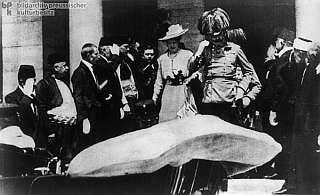
Franz Ferdinand and his wife Sophie leave the Sarajevo Town Hall on 28 June 1914, five minutes before the assassination.
The Good Soldier Švejk is a novel with an unusually rich array of characters. In addition to the many who directly form part of the plot, a large number of fictional and real people (and animals) are mentioned; either through the narrative, Švejk's anecdotes, or indirectly through words and expressions.
This web page contains short write-ups on the people that the novel refers to; from Napoléon in the introduction to Hauptmann Ságner in the last few lines of the unfinished Part Four. The list is sorted in the order of which the names first appear. The chapter headlines are from Zenny Sadlon's recent translation (1999-2024) and will in most cases differ from Cecil Parrott's version from 1973.
The quotes in Czech are copied from the on-line version of The Good Soldier Švejk: provided by Jaroslav Šerák and contain links to the relevant chapter. The toolbar has links for direct access to Wikipedia, Google maps, Google search, svejkmuseum.cz and the novel on-line.
The names are coloured according to their role in the novel, illustrated by the following examples:
- Dr. Grünstein as a fictional character who is directly involved in the plot.
- Fähnrich Dauerling as a fictional character who is not part of the plot.
- Heinrich Heine as a historical person.
Note that a number of seemingly fictional characters are inspired by living persons. Examples are Oberleutnant Lukáš, Major Wenzl and many others. This are still listed as fictional because they are literary creations that are only partly inspired by their like-sounding "models".
Military ranks and some other titles related to Austrian officialdom are given in German, and in line with the terms used at the time (explanations in English are provided as tooltips). This means that Captain Ságner is still referred to as Hauptmann although the term is now obsolete, having been replaced by Kapitän. Civilian titles denoting profession etc. are translated into English. This also goes for ranks in the nobility, at least where a direct translation exists.
 People index of people, mythical figures, animals ... (588)
Show all
People index of people, mythical figures, animals ... (588)
Show all I. In the rear
I. In the rear  1. The good soldier Švejk acts to intervene in the world war (30)
1. The good soldier Švejk acts to intervene in the world war (30) 14. Švejk as military servant to senior lieutenant Lukáš (35)
14. Švejk as military servant to senior lieutenant Lukáš (35) II. At the front
II. At the front  1. Švejk's mishaps on the train (22)
1. Švejk's mishaps on the train (22) 2. Švejk's budějovická anabasis (55)
2. Švejk's budějovická anabasis (55) 3. Švejk's happenings in Királyhida (46)
3. Švejk's happenings in Királyhida (46) 5. From Bruck on the Leitha toward Sokal (45)
5. From Bruck on the Leitha toward Sokal (45) III. The famous thrashing
III. The famous thrashing  1. Across Magyaria (52)
1. Across Magyaria (52) 2. In Budapest (32)
2. In Budapest (32) 3. From Hatvan to the borders of Galicia (31)
3. From Hatvan to the borders of Galicia (31) 4. Forward March! (32)
4. Forward March! (32) IV. The famous thrashing continued
IV. The famous thrashing continued  1. Švejk in the transport of russian prisoners of war (35)
1. Švejk in the transport of russian prisoners of war (35) 3. Švejk again with his march company (20)
3. Švejk again with his march company (20)



|
II. At the front |
 | |
2. Švejk's budějovická anabasis | |||
 | Xenophon |  | |||
| *430 BC Athen - †355 BC ? | |||||
| |||||
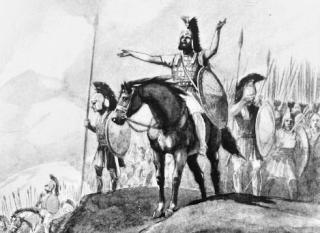
, 1900
Xenophon is mentioned by the narrator when he introduces the reader to the term "anabasis". Xenophon exemplified the anabasis by travelling around "God knows where" without a map. Hašek uses this symbolism in the chapter header Švejkova budějovická anabase and also in the short follow-up where he explains what the word anabasis means.
Background
Xenophon was a Greek commander, author and historian, known for his historical descriptions of ancient Greece, his writings on Socrates, and the first eyewitness account of a battle in ancient times. His best-known book is "Anabasis". It describes the Greek mercenaries' treacherous journey home through Asia Minor after a failed military mission against Persia. It is a seven-volume work and is considered Xenophon's best. It was translated into Czech already in 1853 and by the turn of the century it had become part of Greek language teaching at Czech middle schools (gymnasium).
Nebulous theories
In some literary circles an assumption exists that Hašek meant the term "anabasis" ironically when he wrote The Good Soldier Švejk. Allegedly it is a slur at the Legions and their so-called "Siberian Anabasis". For a discussion on this theme see the article Anabasis.
Quote(s) from the novel
[II.2] Starověký válečník Xenofon prošel celou Malou Asii a byl bůhvíkde bez mapy. Staří Gotové dělali své výpravy také bez topografické znalosti. Mašírovat pořád kupředu, tomu se říká anabase. Prodírat se neznámými krajinami. Být obklíčeným nepřáteli, kteří číhají na nejbližší příležitost, aby ti zakroutili krk.
Credit: Radko Pytlík, Jaroslav Hašek, Jiří Fiala, Antoni Kroh, Abigail Weil, Ferdinand Hoffmeister, Sergey Soloukh
Also written:XenofónczXenophonde
Literature
- Výbor ze spisů Xenofontových, Anabase, Kyrupaideie, ,1910
- V cizích službách, ,1886
- Proč dostal profesor Fridrich Nobelovu cenu míru, Jaroslav Hašek,26.4.1912
- Okrašlovací spolek, Jaroslav Hašek,12.5.1922
 | Caesar, Julius |  | |||
| *13.7.100 BC ? Roma - †15.3.44 BC Roma | |||||
| |||||

, 1892

Curriculum, gymnasium Žitná ulice, 1896

"Jednoročáci", , 1931
Caesar is mentioned by the author when he introduces the reader to the term "anabasis". Caesar's legions marched all the way to the Gallic Sea without maps.
In [II.2], in the cell in Budějovice, Einjährigfreiwilliger Marek invokes the name of Caesar through the saying: Morituri te salutant, Caesar!" (The dead salute you ...)
Background
Caesar was a Roman commander, politician and author. He had become most potent citizen of Roman Empire when he was murdered by senator Brutus in 44 BC. At that time he held the title "dictator in perpeteo". During his reign he undertook extensive reforms, centralising the administration. The area of the empire was greatly extended, including Britannia.
The Gallic Sea
In The Good Soldier Švejk the source of the information about the legions and Gallic Sea seems to be Caesar's own book De Bello Gallico (The Gallic Wars)[a]. It is also worth noticing that this work was on the Latin curriculum in the 4th year at the gymnasium that Hašek attended[b].
Morituri te salutant
The saying "morituri te salutant" is of unknown origon and is hardly known in Roman history writing. One theory is that it was used by gladiators before they entered the fight. Einjährigfreiwilliger Marek's interpretation is that it refers to Emperors in general and not the person Caesar and this is the most widespread assumption. There are several variations, amongst them Ave, Imperator, morituri te salutant and Ave, Caesar, morituri te salutant. On the other hand Marek struggles with conjugation og Latin verbs. The term means "those about to die salute you", not "the dead salute you".
Quote(s) from the novel
[II.2] Tam někde na severu u Galského moře, kam až se také dostaly římské legie Caesarovy bez mapy, řekly si jednou, že se zas vrátí a pomašírujou jinou cestou, aby ještě víc toho užily, do Říma. A dostaly se tam také. Od té doby se říká patrně, že všechny cesty vedou do Říma.
[II.2] Morituri te salutant, Caesar! Mrtví tě pozdravují, císaři, ale profous je pacholek.
Also written:Julius CaesarczJulius CäsardeGaius Iulius Caesarla
Literature
- Clas Merdin: Tales from the Enchanted Island, [a]
- Devátá výroční zpráva cís. král. vyššího gymnasia v Žitné ulici v Praze, ,1896 [b]
| a | Clas Merdin: Tales from the Enchanted Island | ||
| b | Devátá výroční zpráva cís. král. vyššího gymnasia v Žitné ulici v Praze | 1896 |
 | Mašků, Antonín |  | ||||
| ||||||

, 20.4.1915
Toníček Mašků had ran away from the call-up to k.k. Landwehr in Plzeň but was caught soon after. He was the husband of a niece of the old lady who helped Švejk by Vráž. The latest news was that he had lost a leg at the front.
Background
Toníček Mašků doesn't appear to have any real life model. One track may be information from the old grandmother in Vráž that he was called up to join k.k. Landwehr in Plzeň and that he had lost a leg. The first indicates that he served with k.k. Landwehrinfanterieregiment Nr. 7. Had he lost a leg he would also figure in a Verlustliste but didn't. Additionally one would expect a recruit with Heimatrecht Vráž to serve in Písek's k.k. Landwehrinfanterieregiment Nr. 28 and not in Plzeň.
Mašků is not an official surname but searches in the casualty list for the similar Antonín Mašek give hits, albeit none with k.k. Landwehrinfanterieregiment Nr. 7. Interestingly there was one in IR. 91 but connecting him to the k.k. Landwehr soldier from Vráž is far fetched.
Quote(s) from the novel
[II.2] „U nás byl taky jeden takovej nezbeda. Ten měl ject do Plzně k landvér, nějakej Toníček Mašků,“ povzdechla si babička, „von je vod mojí neteře příbuznej, a vodjel. A za tejden už ho hledali četníci, že nepřijel ku svýmu regimentu. A ještě za tejden se vobjevil u nás v civilu, že prej je puštěnej domů na urláb. Tak šel starosta na četnictvo, a voni ho z toho urlábu vyzdvihli. Už psal z fronty, že je raněnej, že má nohu pryč.“
 | Pantáta Melichárek |  | ||||
| ||||||
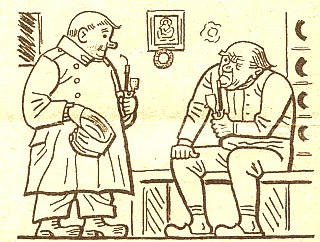
,17.2.1924

,6.1936
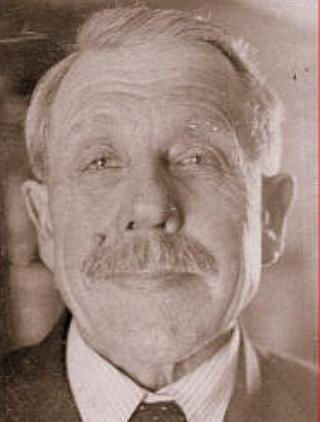
Václav Melichar
© Ivana Sibková
Melichárek was a farmer and brother of the old woman from Vráž. He lived in Radomyšl in Dolejší ulice behind Floriánek. He was very suspicious of Švejk who he assumed had deserted and wanted nothing to do with him.
Background
Melichárek is supposed to have been inspired by Václav Melichar who lived in Dolejší ulice, just as the author writes. According to his descendants, Hašek visited Radomyšl in 1915 and Melichár's wife is said to have made him "bramborovka". The story featured in televizion programmes both in 1983 and 2002[a].
The mystery is how Hašek got this far from Budějovice without being noticed (60 km). Although several witnesses reveal that Hašek went on detours during his time in IR. 91, none of them confirmed that he got as far as Radomyšl.
Melichar
Václav Melichar was born in 1878 so he would have been 36 when Hašek allegedly visited. This rules out that he could have been the brother of any old grandmother from Vráž as described in The Good Soldier Švejk. He and wis wife Anna bought the cottage Chalupa Mlčonavská at Radomyšl No. 15 in 1912.
Quote(s) from the novel
[II.2] V Radomyšli Švejk našel k večeru na Dolejší ulici za Floriánkem pantátu Melichárka. Když vyřídil mu pozdrav od jeho sestry ze Vráže, nijak to na pantátu neúčinkovalo. Chtěl neustále na Švejkovi papíry. Byl to nějaký předpojatý člověk, poněvadž mluvil neustále něco o raubířích, syčácích a zlodějích, kterých se síla potlouká po celém píseckém kraji.
Credit: Miroslav Vítek, Ivana Sibková, Ivana Jonová, Jaroslav Šerák
Literature
- Po cestách Švejkovy budějovické anabáze, ,2020 [a]
- Jak to bylo s Floriánkem, pantátou Melichárkem a babičkou u Vráže,
| a | Po cestách Švejkovy budějovické anabáze | 2020 |
 | Jew Herrman, Robert |  | ||||
| *27.12.1885 Lipnice - †1943 Auschwitz | ||||||
| ||||||
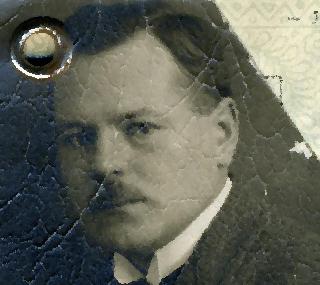
Passport photo from 1921
Herrman was a trader in Vodňany who bought military equipment that he sold in the surrounding villages. In the opinion of the wanderer who accompanied Švejk from Štěkno to Švarcenberský ovčín he would surely buy Švejk's uniform.
Background
Herrman was not an uncommon surname but is not entered under Vodňany in the address book from 1915[a]. Miroslav Vítek did however get a step closer by investigating the census records from 1910 and here a Jew named Robert Herman is listed[b]. He was a merchant and former travelling salesman who traded in textiles in Vodňany then. He lived in Husova ul. č.p. 60[x]. Herrman was actually born at Lipnice and this could explain why Hašek knew about him.
Vítek’s meticulous research has opened the door for more specific investigations in newspapers and not the least in the Czech Holocaust archive[c]. Based on these sources one can in rough terms outline the life-story of the textile trader from Vodňany.
From Lipnice to Bavaria
Robert Herrmann (also written Hermann, less often Herman) was born in Lipnice 27 December 1885 with Heimatrecht Lipnice, okres Německý Brod. He was a son of Sigmund Herrmann and Aloisie Louisa (née Schwenger) and was the second born of eight siblings. His father was born 6 January 1859 in (Volichov 17) 2 km from Lipnice and his mother in nearby Kejžlice 1 January 1861[m]. Munich 1907, sentenced for petty fraud

Little is known about his childhood, teenage years, education and military service. He was due for compulsory military service from 1906. Surprisingly the first trace of him comes from abroad as he in Munich on 19 January 1907 was found guilty of fraud and sentenced to two days in prison and a 10 Mark fine[c].
Vodňany

Exactly when he moved to Vodňany is not knows, but it is firmly established that he married Františka Khonová here on 23 February 1908[c]. His bride was from Vodňany itself, born 8 May 1885, and like her husband she was of Jewish confession. A brazen provocation is often being carried out, especially on Saturdays and Sundays, by a little Jewboy Hermann, as he revels in an apartment by Khónka on the square in the evening with the window open and on a loud gramophone plays German songs and various German street vaudevilles and timeworn tunes. It is up to our burgomaster’s office to take resolute action against this unprecedented impudence. If a Czech were to dare something similar in a German town, they would break his windows and jail him for disturbing public peace. , 18.4.1908 (tr. Zenny Sadlon)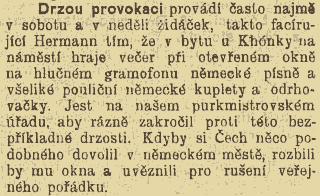
Soon after the name of the newly-wed merchant appeared in the local newspaper Jihočeské ohlasy (Týn nad Vltavou). Already on 18 April 1908 they wrote about a “brazen provocation” in a flat on the square židáček* Hermann often played German music loudly on a gramophone, with a window to the square open. "If a Czech allowed himself something similar in a German town he would have his windows broken and would have been jailed for breach of public peace" the newspaper noted[d]. This seems to have been the start of an ongoing quarrel between this newspaper and Herrmann.
* židáček: Derogatory term for Jew.
The next recorded incident happened on 13 May 1909 on a local market. Hermann had an argument with Kateřina Zimerhanzlová from Budějovice and was abused as an "impertinent and rude Jew who deserved a few slaps in the face". He sued here for libel and won the court case[e]. Jihočeské ohlasy however sided with the woman and also refused to print the comments that Herrmann’s lawyer, dr. Kučera, sent to the paper (they were according to the law obliged to do so). Herrmann then sued the paper because of this refusal and in addition for libel. Again the court agreed and afterwards he publicly thanked dr. Kučera for having restored his honour. This was through an advert in Šumavské proudy, printed on 12 February 1910[f]. , 15.10.1911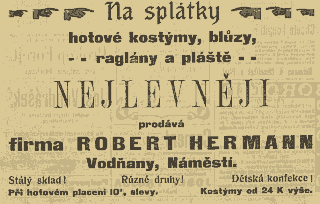
His business was however less successful and in December 1910 his firm went bankrupt[g]. This was reported in Jihočeské ohlasy who gloated and ironically reported that Herrmann now was well again after having been ill[j]. Still he seems to have started up again later that year because he advertised both in 1911 and until March 1912, even in Prager Tagblatt. Jihočeské ohlasy appears to have conducted a smear campaign against Herrmann. That he was a German chauvinist appears unlikely as the during the census in 1910 reported his mother tongue as Czech[x]. He was even referred to as "the ill-reputed merchant"[h]. Smear campaign or not: he did not have an entirely clean record because on 19 July 1911 he was sentenced to 14 days in jail at the Písek district court[c].
Prague

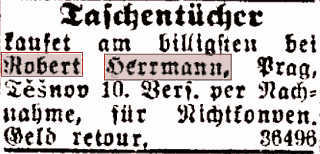
,21.12.1912
After four turbulent years in Vodňany the young couple moved to Prague where they from 13 September 1912 are registered with domicile Praha II., Těšnov 1743/10[i]. The next year they lived in Eliščina třída 1503/28 (now Revoluční) where their first son was born. In Prague, Herrmann started modestly by selling handerchiefs[k], exactly like he did towards the end in Vodňany. He seems to have expanded his business gradually. The couple had three sons: Jiří, Bedřich and Zdeněk, born in 1913, 1915 and 1919 respectively.
We have yet to see any documents that prove if Herrmann ever did military service or was called up during the war. In 1921 he applied for and was granted a passport and the photo of him used on this web page is from related documents, stored in the police archives. In 1930 the family still lived in Praha II., Revoluční třida 1503/28. In 1937 their address was Hlubočepy 369, a detached dwelling on the southern outskirts of Prague, and this is where they lived until they were deported by the Nazis.
Deported and murdered

Police records, 1938.
For the Herrmann family and other Jews the Nazi occupation from March 1939 onwards had tragic consequences. Already towards the end of the year the police had collected information that classified him as a Jew. Imprisonment followed on 4 December 1941 as he was accused of illegal trade with textiles, which surely was a mere pretext. On 17 December he was transported to Terezín (Theresienstadt) and on 6 September 1943 onwards to Auschwitz where he was murdered[c]. His wife was in the same transport and suffered the same gruelling fate. Their sons Zdeněk and Jiří were also murdered by the Nazis but the fate of Bedřich is not known. His father Sigmund, also a merchant, was deported and died in Terezín at the age of 83. His mother Aloisie had passed away already in 1925.
Quote(s) from the novel
[II.2] „Tak ten si nech. V tom se na venkově chodí. Potřebuješ kalhoty a kabát. Až budeme mít ten civil, tak kalhoty a kabát prodáme židovi Herrmanovi ve Vodňanech. Ten kupuje všechno erární a zas to prodává po vesnicích.
Credit: Miroslav Vítek
Literature
- Chytilův úplný adresář Království Českého, ,1915 [a]
- Po cestách Švejkovy budějovické anabáze, ,2020 [b]
- Sčitání lidu Vodňany, ,1910 [x]
- Panu L. D. Hájkovi, redaktorovi Národních Listů, Jaroslav Hašek,12.11.1921 Fond Břetislav Hůla
- Pobytové přihlášky pražského policejního ředitelství, ,1851 - 1914 [i]
- Soupis pražských domovských příslušníků 1830-1910 (1920), [k]
- Robert Herrmann, [c]
- Siegmund Herrmann,
- Františka Herrmannová,
- Jiří Herrmann,
- Zdeněk Herrmann,
- Sigmund Herrmann (1859 - 1942), [m]
- Drzou provokaci, ,18.4.1908 [d]
- Nekalá soutěž, ,29.5.1909 [e]
- Žalobu, ,26.6.1909
- Panu dru. Kučerovi, ,17.9.1909
- Ještě Hermann, ,2.10.1909 [h]
- Podařená reklama, ,15.10.1909
- Díkůvydání!, ,12.2.1910 [f]
- Insolvenzen, ,10.12.1910 [g]
- Vyléčen, ,4.3.1911 [j]
- Na splátky, ,15.10.1911
- Packware in Taschentücheln, ,3.2.1912
| a | Chytilův úplný adresář Království Českého | 1915 | |
| b | Po cestách Švejkovy budějovické anabáze | 2020 | |
| c | Robert Herrmann | ||
| d | Drzou provokaci | 18.4.1908 | |
| e | Nekalá soutěž | 29.5.1909 | |
| f | Díkůvydání! | 12.2.1910 | |
| g | Insolvenzen | 10.12.1910 | |
| h | Ještě Hermann | 2.10.1909 | |
| i | Pobytové přihlášky pražského policejního ředitelství | 1851 - 1914 | |
| j | Vyléčen | 4.3.1911 | |
| k | Soupis pražských domovských příslušníků 1830-1910 (1920) | ||
| m | Sigmund Herrmann (1859 - 1942) | ||
| x | Sčitání lidu Vodňany | 1910 |
 | Jareš |  | |||
| |||||
Jareš was the grandfather of the pond warden from Ražice, and was executed as a deserter during the Napoleonic wars. It happened in Písek and before he was executed he was hounded through the streets by soldiers and beaten with sticks 600 times. The information is revealed during the conversation at Švarcenberský ovčín.
Background
This is another Jareš that seems to be inspired by the author's grandfather. See pondwarden Jareš.
Quote(s) from the novel
[II.2] Z Ražic za Protivínem syn Jarešův, dědeček starýho Jareše, baštýře, dostal za zběhnutí prach a volovo v Písku. A před tím, než ho stříleli na píseckých šancích, běžel ulicí vojáků a dostal 600 ran holema, takže smrt byla pro něho vodlehčením a vykoupením.
 | Fürst Schwarzenberg (st.) |  | ||||
| ||||||
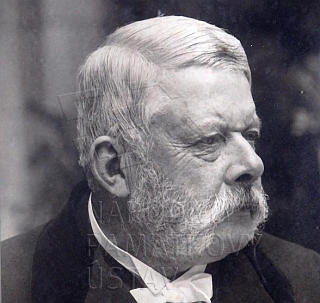
Adolf Josef Schwarzenberg, detail - portrét z oslav zlaté svatby, 1907

Český svět, 14.6.1907
Schwarzenberg (st.) (the old prince Schwarzenberg) is mentioned by the old shepherd in Švarcenberský ovčín. He tells us that at least the old Schwarzenberg used to travel around in an ordinary carriage but nowadays the young prince drives around in an auto-mobile.
Background
Schwarzenberg (st.) probably refers to Adolf Joseph Schwarzenberg (1832-1914), head of the Krumlov-Hluboká family branch (primogenitura) and the owner of the Libějovice estate to which Hašek's presumed Švarcenberský ovčín belonged[a].
He is talked about as the old prince Schwarzenberg and the fact that he died in 5 October 1914 at Libějovice at an advanced age fits the conversation at the sheep house. He is referred to in the past tense whereas the young prince is talked about in present tense.
Adolf assumed ownership of the estates of Netolice, Libějovice and Protivín already in 1857, the rest followed after his father's death in 1888. He also enjoyed a military career, attaining the rank of major. He participated in the battle of Solferino 24 June 1859. After the battle he retired from the army and dedicated himself to politics and management of his estate. He raised 9 children, and his son Johann Nepomuk II. succeeded him as head of the estate.
Quote(s) from the novel
[II.2] Dyť vona i ta naše vrchnost už roupama nevěděla co dělat.Starej pán kníže Švarcenberg, ten jezdil jen v takovým kočáře, a ten mladej knížecí smrkáč smrdí samým automobilem. Von mu pánbůh taky ten benzin vomaže vo hubu.“
Credit: Miroslav Vítek
Literature
- Po cestách Švejkovy budějovické anabáze, ,2020 [a]
- Kníže Adolf Josef Schwarzenberg zemřel, ,7.10.1914
- Knížecí Schwarzenbergský šematismus I. a II. majorátu na rok 1894,
| a | Po cestách Švejkovy budějovické anabáze | 2020 |
 | Fürst Schwarzenberg (ml.) |  | |||
| |||||
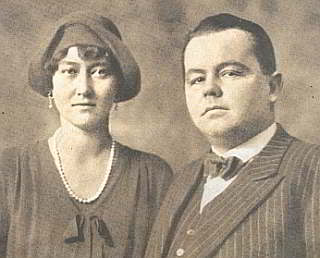
Adolf Johann Schwarzenberg
Schwarzenberg (ml.) (the young prince Schwarzenberg) is mentioned by the old shepherd in Švarcenberský ovčín. He tells us that at least the old Schwarzenberg used to move around in an ordinary carriage but nowadays the young prince drives around in an auto-mobile, and that the Good Lord will rub his snout in petrol one day.
Background
Schwarzenberg (ml.) may refer to Johann Nepomuk Schwarzenberg (1860-1938) or rather his son Adolf Johann (1890-1950). Both were car enthusiasts and very early they embraced the novel mean of transport.
Both were in turn heads of the Krumlov-Hluboká branch of the family (primogenitura), and they owned the sheep farm by Bavorov that we assume is Hašek's Švarcenberský ovčín. Johann bought his first car in 1905 and later added several more[a]. Antonín Nikendey was amongst several sources who confirmed that the son Adolf was an auto-mobile enthusiast in his younger years[b].
Adolf seems to be the best candidate, mostly due to his young age (in 1915 he was 25). In a book fromm 2008 his nephew Karel Jan stated that it actually was Adolf who inspirerte HAS[a], a claim that for obvious reasons is impossible to verify. For the old shepherd even his father would have been a youngster (Johann was 55 in 1915). In 1915 Johann Nepomuk II. owned the estate, his son was serving in the army.
Quote(s) from the novel
[II.2] Dyť vona i ta naše vrchnost už roupama nevěděla co dělat. Starej pán kníže Švarcenberg, ten jezdil jen v takovým kočáře, a ten mladej knížecí smrkáč smrdí samým automobilem. Von mu pánbůh taky ten benzin vomaže vo hubu.“
Credit: Miroslav Vítek
Literature
- Po cestách Švejkovy budějovické anabáze, ,2020 [a]
- K narozeninám JUDr. Adolfa Schwarzenberga, ,1990 [b]
| a | Po cestách Švejkovy budějovické anabáze | 2020 | |
| b | K narozeninám JUDr. Adolfa Schwarzenberga | 1990 |
 | Kořínek |  | |||
| |||||
Kořínek was arrested for sedition in Skočice after saying that after the war one would get rid of Emperors, and that the nobility would have their estates confiscated. This is what the old shepherd at Švarcenberský ovčín told Švejk and the tramp who was there with them.
Background
Attempts to identify any person who may have inspired Hašek to introduce this figure have proved futile. According to the 1910 census no person with this surname lived in Skočice[a].
Quote(s) from the novel
[II.2] „Na to se mu, hochu, teď každej vykašle,“ rozdrážděně promluvil ovčák, „máš bejt při tom, když se sejdou sousedi dole ve Skočicích. Každej tam má někoho, a to bys viděl, jak ti mluvějí. Po tejhle válce že prej bude svoboda, nebude ani panskejch dvorů, ani císařů a knížecí statky že se vodeberou. Už taky kvůli takovej jednej řeči vodvedli četníci nějakýho Kořínka, že prej jako pobuřuje. Jó, dneska mají právo četníci.“
Literature
- Sčitání lidu Skočice, ,1910 [a]
| a | Sčitání lidu Skočice | 1910 |
 | Wachtmeister Flanderka |  | |||
| |||||
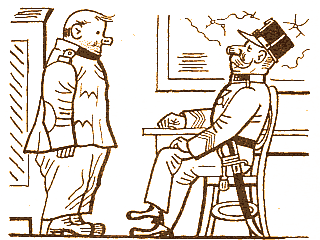
,10.2.1924
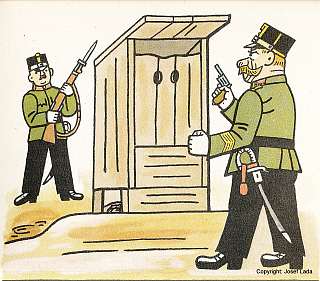
Flanderka guarding Švejk in Putim
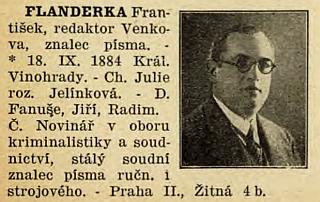
Kulturní adresář ČSR, 1934-1936
Flanderka was head of Gendarmeriestation Putim and suspected Švejk of being a Russian spy. He considered himself a master of interrogation techniques and it soon became clear to him that Švejk was indeed a spy. The more he tanked up, the clearer it all became. He and his deputy also made complete fools of themselves with extremely seditious talk when they had enjoyed a drop too much. Austria was going to loose the war, a Russian prince would become king of Bohemia and Emperor Franz Joseph I., was shitting all over Schönbrunn. The petrified old servant Pejzlerka who had witnessed it all, had to swear never to tell a living soul what she had heard. From the dialogue it is also apparant that Flanderka had served in Putim for 15 years and that he had at least two assistants.
Background
Considering that the part of the plot that was set in Putim has no obvious historical base one would not expect to find any real life prototype for Flanderka. This is confirmed by the fact that this surname didn't appear in Putim in the 1910 census, nor was any Flanderka listed in the k.k. Gendarmerie.
Flanderka is a quite common surname and Hašek might have known a few of them and taken the liberty to borrow the name. One person that the author of The Good Soldier Švejk probably knew was the illustrator Jaroslav Flanderka (1877-?) who from 1909 onwards contributed to Humoristické listy, a publication that at times also published Hašek's stories[a].
An even more tangible connection is the typographer František Josef Flanderka (1884-?)[c]. According to Julie Flanderková he was a friend of Hašek until the two fell out in the pub Maxim on the periphery of Malá Strana towards Smíchov. Flanderková (she seems to have been his wife) was of the opinion that Hašek took revenge by sticking the name Flanderka to the stupid policeman in Putim[b]. Flanderka eventually became editor of Venkov.
Quote(s) from the novel
[II.2] Četnickému strážmistrovi Flanderkovi se situace, čím déle psal tou podivnou úřední němčinou, vyjasňovala, a když skončil: „So melde ich gehorsam, wird der feindliche Offizier heutigen Tages, nach Bezirksgendarmeriekommando Písek, überliefert,“ usmál se na své dílo a zavolal na četnického závodčího. „Dali tomu nepřátelskému důstojníkovi něco jíst?“
Literature
- J. Flanderka, ,18.4.1910 [a]
- Haškova pomsta, Julie Flanderková [b]
- Pobytové přihlášky pražského policejního ředitelství, ,1851 - 1914 [c]
- Z putimské strážnice,
| a | J. Flanderka | 18.4.1910 | |
| b | Haškova pomsta | Julie Flanderková | |
| c | Pobytové přihlášky pražského policejního ředitelství | 1851 - 1914 |
 | Oberleutnant Berger |  | ||||
| ||||||
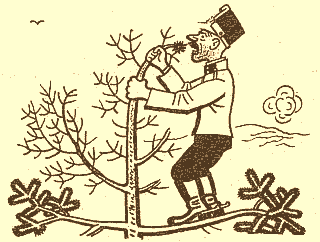
,10.2.1924


Sagner climbed a 15 metres tall tree to assist the heavy artillery in aiming the fire. From Sagner's "Vormerkblatt".
© VHA
Berger was a duty-conscious obrlajtnant from the artillery who according to Národní politika had established an observation post in a tree, and hid there for two weeks to avoid captivity. When his own troops returned he fell down and killed himself. This was a story that Wachtmeister Flanderka told his assistant at Gendarmeriestation Putim.
Background
Berger was a very common surname and there were more than 50 officers with this name in k.u.k. Heer alone, most of them serving with the infantry. In 1914 five Berger with the rank Oberleutnant were listed in Schematismus[a]. In addition there were a number of lieutenants that may have been promoted by the time the plot reached Putim, probably in early 1915.
In the artillery there was no Oberleutnant Berger in 1914 but in the Rangliste for 1916 a Theodor Berger is listed in Feldkanonenregiment Nr. 21. He was however promoted on 1 July 1915 so Wachtmeister Flanderka could not have read about him as senior lieutenant earlier that year. On 1 March Richard Berger in Feldkanonenregimnet Nr. 42 had been promoted to senior lieutenant (reservist).
Sagner in the tree
The story has a curious parallel to an episode involving Hašek's future commander Čeněk Sagner. In Serbia on 4 November 1914 he climbed a 15 metres tall tree to assist the heavy artillery with aiming the fire[b]. Such a spectacular deed may well have been retold and caught Hašek's ear in 1915 when veterans related stories and hearsay from the campaign previous autumn. Sagner's rank at the time was indeed senior lieutenant.
Quote(s) from the novel
[II.2] Kdyby bylo v Rakousku takové nadšení... ale nechme toho raději. I u nás jsou nadšenci. Četli v ,Národní politice’ o tom obrlajtnantovi Bergrovi od dělostřelectva, který si vylezl na vysokou jedli a zřídil si tam na větví beobachtungspunkt?
Literature
- Schematismus für das k.u.k. Heer (s. 391), ,1914 [a]
- Jednadevadesátníci, ,2018 [b]
| a | Schematismus für das k.u.k. Heer (s. 391) | 1914 | |
| b | Jednadevadesátníci | 2018 |
 | Wachtmeister Bürger |  | ||||
| ||||||
Bürger was Wachtmeister Flanderka's predecessor as head of k.k. Gendarmerie in Putim until fifteen years ago, in other words around 1900. He never interrogated anyone, just sent them on to Písek.
Background
It has not been possible to find any real life parallel/inspiration for this policeman. It would surely be futile in any case as even Gendarmeriestation Putim itself is an invention.
Quote(s) from the novel
[II.2] Vzpomněl si na svého předchůdce strážmistra Bürgera, který se zadrženým vůbec nemluvil, na nic se ho netázal a hned ho poslal k okresnímu soudu s krátkým raportem: „Dle udání závodčího byl zadržen pro potulku a žebrotu.“ Je to nějaký výslech?
 | Pepík Vyskoč |  | ||||
| ||||||
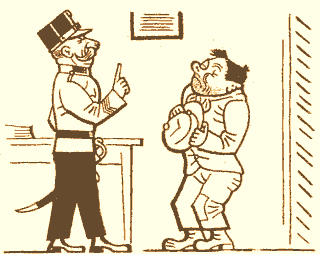
Flanderka instructs Pepík Vyskoč
,10.2.1924
Pepík Vyskoč was a village idiot who Wachtmeister Flanderka tried to hire as an informer. He was told to report anyone who said that the Emperor was a piece of cattle. Pepík took this literally, he told others that Flanderka had said that the Emperor was cattle and that the thing (the war) couldn't be won. Pepík was arrested and sentenced to twelve years by the military court in Prague. He got the nick-name because he bleated like a goat and jumped into the air when someone talked to him.
Background
This is a character that no doubt inspired by Zdenko Václav Kompit, better known as Venca Vyskoč. The connection was first pointed out to me by Sergey Soloukh in 2015 and Jaroslav Šerák provided further details in 2022.
A dubious link to Lipnice
Far less credible is Vladimír Stejskal (1953) and his claim that the inspiration was a character from the area around Lipnice. The evidence is weak: not much more than pure hearsay and the fact that Hašek wrote this part of the novel just after arriving at Lipnice on 25 August 1921.
Quote(s) from the novel
[II.2] Toho si dal zavolat a řekl k němu: „Víš, Pepku, kdo to je starej Procházka?“ „Méé.“„Nemeč, a pamatuj si, že tak říkají císaři pánu. Víš, kdo je to císař pán?“ „To je číšaš pán.“ „Dobře, Pepku. Tak si pamatuj, že když někoho uslyšíš mluvit, když chodíš po obědech od domu k domu, že je císař pán dobytek nebo podobně, hned přijď ke mně a oznam mně to.
Credit: Jaroslav Šerák, Sergey Soloukh, Karel Ladislav Kukla, Augustin Knesl
Also written:Pepek VyskočParrottPepku HoppReinerJoey JumpSadlon
Literature
- "Venca Vyskoč" už doskákal svoji životní pouť, ,21.9.1926
 | starý Procházka |  | |||
| |||||

Zlatá Praha, 21.7.1901
Starý Procházka is mentioned by Wachtmeister Flanderka when he recruits Pepík Vyskoč as an informer. He repapears soon after when one of the drunk policemen at Gendarmeriestation Putim exclaims that the emperor and king must is kept locked up in the toilet to prevent him from shitting all over Schönbrunn.
Background
Starý Procházka was a Czech nickname for Emperor Franz Joseph I. In 1901 he visited Prague and pictures of him appeared walking on Most císaře Františka I., now Most Legii. One of the pictures allegedly had the title Procházka na mostě but it has not been established which picture and where it was printed. The photos were from the opening of the bridge on 14 June. "Procházka" is a common Czech surname that roughly means "walk" (noun) or "walkabout".
Quote(s) from the novel
[II.2] Toho si dal zavolat a řekl k němu: „Víš, Pepku, kdo to je starej Procházka?“ „Méé.“„Nemeč, a pamatuj si, že tak říkají císaři pánu. Víš, kdo je to císař pán?“
[II.2] ,Pamatujou, bábo, že každý císař a král pamatuje jen na svou kapsu, a proto vede válku, ať je to třebas takový dědek jako starý Procházka, kterého nemohou už pustit z hajzlu, aby jim nepodělal celý Schönbrunn"...
Also written:Old ProcházkaEnglishAlte ProchazkaReiner
Literature
 | Minister von Georgi, Friedrich |  | |||
| *27.1.1852 Praha - †23.6.1926 Wien | |||||
| |||||
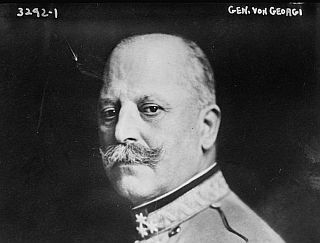
Friedrich Freiherr von Georgi, 1914
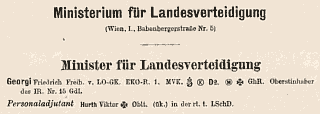
Schematismus der K. K. Landwehr..., 1914
1914
Minister für Landesverteidigung (minister of land defence) is mentioned in the bad dream that Wachtmeister Flanderka has regarding all the directives sent from k.k. Ministerium für Landesverteidigung.
Background
Because Švejk's anabasis by Putim necessarily must have taken place in early 1915, the minister who haunted Wachtmeister Flanderka in his dreams was no doubt Friedrich Freiherr von Georgi. He was head of k.k. Ministerium für Landesverteidigung (i.e. secretary of defence) in Cisleithania from 1907 to 1917, and was thus formally head of both k.k. Landwehr and k.k. Gendarmerie.
Georgi was regarded an excellent organiser and also a person who was capable of operating both in the military and in politics. These seem to have been the reasons why his application to serve at the front where rejected[a]. At the outbreak of war his rank was general. Friedrich von Georgi was born in Prague and hailed from a family of officers.
Quote(s) from the novel
[II.2] Neustále očekával inspekci, vyšetřování. V noci zdálo se mu o provaze, jak ho vedou k šibenici. A ještě naposled se ho sám ministr zemské obrany pod šibenicí táže: „Wachmeister, wo ist die Antwort des Zirkulärs No 1789678/23792 X.Y.Z.?“
Literature
- Friedrich Freiherr von Georgi, ,2001 - 2016 [a]
| a | Friedrich Freiherr von Georgi | 2001 - 2016 |
 | Gendarm Rampa |  | ||||
| ||||||
Rampa was a gendarm (četnik) in Putim who was on inspection-duty around the neighbouring villages when Švejk was locked up here, but was right now playing cards with some shoemakers at U černého koně in Protivín, explaining during the breaks that Austria had to win (the war).
Background
Rampa is a petty rare surname and most of them are now (2021) concentrated in a limited area west and south of Praha[a]. There was obviously no gendarm with this surname at Gendarmeriestation Putim simply because this police station didn't exist. Nor is there any sign of any Rampa at nearby police stations like Protivín. Thus we can assume that Hašek simple borrowed the name more or less at radom and assigned it to a policeman. It probably has the same origin as pubkeeper Rampa from Vinohrady (he appears later on in the chapter).
Quote(s) from the novel
[II.2] Strážmistr zůstal sedět na strážnici vedle Švejka na kavalci prázdné postele četníka Rampy, který měl do rána službu, obchůzku po vesnicích, a který v tu dobu klidně seděl „U černého koně“ v Protivíně a hrál s obuvnickými mistry mariáš, vykládaje v přestávkách, že to Rakousko musí vyhrát.
Literature
- Příjmení: 'Rampa', počet výskytů v celé ČR, ,2017 [a]
| a | Příjmení: 'Rampa', počet výskytů v celé ČR | 2017 |
 | Pejzlerka |  | ||||
| ||||||
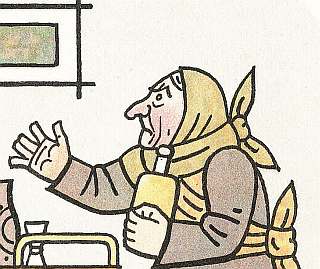
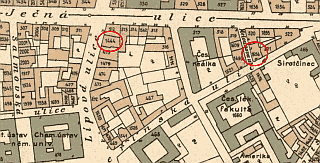
Where Peisler lived in 1907 and 1910
Pejzlerka was an old woman who served at Gendarmeriestation Putim. During the night that Švejk was interned here she shuttled back and forth to Na Kocourku to fetch beverages for the gendarmes and Švejk. Unfortunately she overheard the politically suspect conversation between the drunk gendarmes and the next morning she had to swear by the crucifix not to tell a living soul.
Otherwise it is revealed that she hadn't been paid for three years. The reason was that Wachtmeister Flanderka knew that her son was a poacher and was thus able to blackmail her.
Background
Pejzlerka is neither a Czech first name nor a surname. It is therefore logical to assume that it was a nickname for some woman Pejzler or similar. Still not even this name is found in name databases. The German phonetically equivalent Peisler does however exist, despite it being rare.
In the Prague address books from 1907 and 1910 only one man with the surname Peisler is listed. František Peisler lived in an area of Praha II. that Hašek knew very well as it was his stomping ground and he also frequented the area a lot during the whole pre-war period. Peisler's address in 1907 was Melounová ul. 1654/2[a] and in 1910 he had moved to Lipová ul. 1444/18[b], a stone's throw further down towards Vltava.
Everything considered it could be that Peisler's wife or some other female relation was nicknamed "Pejzlerka" in Czech. Still it would be far fetched to conclude that Hašek knew (about) her and subsequently borrowed the name, but is remains a possibility.
Another possible source of inspiration is some variation of the surname Pejzl. The name is more widespread than Peisler although it is not found in Prague's police register or in the address books. Interesting is also the fact that several Pejzl's live in the area around Lipnice[c] and surely also did so in 1921.
Quote(s) from the novel
[II.2] A bába Pejzlerka, která jim posluhovala, se opravdu proběhla. Po večeři se cesta mezi četnickou stanicí a hospodou „Na Kocourku“ netrhla. Neobyčejně četné stopy těžkých velkých bot báby Pejzlerky na té spojovací linii svědčily o tom, že strážmistr si vynahražuje plnou měrou svou nepřítomnost „Na Kocourku“.
Literature
- Adresář královského hlavního města Prahy a obcí sousedních, ,1907 [a]
- Adresář královského hlavního města Prahy a obcí sousedních, ,1910 [b]
- Příjmení: 'Pejzl', počet výskytů v celé ČR, ,2017 [c]
| a | Adresář královského hlavního města Prahy a obcí sousedních | 1907 | |
| b | Adresář královského hlavního města Prahy a obcí sousedních | 1910 | |
| c | Příjmení: 'Pejzl', počet výskytů v celé ČR | 2017 |
 | Nicholas Nikolaevich |  | ||||
| *18.11.1856 St.Petersburg - †5.1.1929 Antibes | ||||||
| ||||||

,25.1.1907
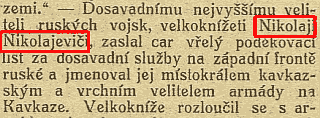
,9.9.1915
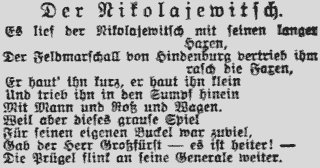
,20.6.1915
Nicholas Nikolaevich is mentioned when it is revealed what unpatriotic views were uttered during the drinking binge at Gendarmeriestation Putim. Nicholas Nikolaevich would soon be in Přerov, Wachtmeister Flanderka is reported to have said. Hi assistent concluded for his part the Nikolaj would become Czech king.
Background
Nicholas Nikolaevich was a grand duke from the Romanov house and Russian commander in chief from the outbreak of war until 5 September 1915 (23.8) when Tsar Nicholas II personally took charge. This was a result of the setbacks suffered during the summer of 1915 when the Russians were forced out of Poland and Galicia. Nicholas was subsequently appointed viceroy and commander at the Caucasus front[a].
As a curiosity we can mention that Nicholas featured in the poetry collection Die eiserne Faust by Greinz, together with Sir Edward Grey, Churchhill and many others![b]
Quote(s) from the novel
[II.2] Nakláněje se k uchu strážmistra, šeptal: „Že jsme všichni Češi a Rusové jedna slovanská krev, že Nikolaj Nikolajevič bude příští týden v Přerově, že se Rakousko neudrží, aby jen, až bude dál vyšetřován, zapíral a pletl páté přes deváté, aby to vydržel do té doby, dokud ho kozáci nevysvobodí, že už to musí co nejdřív prasknout, že to bude jako za husitských válek, že sedláci půjdou s cepy na Vídeň, že je císař pán nemocný dědek a že co nejdřív natáhne brka, že je císař Vilém zvíře, že mu budete do vězení posílat peníze na přilepšenou a ještě víc takových řečí...“
[II.2] "Oni se také pěkně vyjádřili," přerušil ho strážmistr, "kde jen přišli na takovou hloupost, že Nikolaj Nikolajevič bude českým králem?"
Also written:Nikolaj NikolajevičczNikolai NikolajewitschdeНиколай Николаевичru
Literature
- Zaren overtar selv overkommandoen, ,8.9.1915 [a]
- Kriegs-Marterln, ,20.6.1915 [b]
- Högsta ledningen av Rysslands stridskrefter, ,9.9.1915
| a | Zaren overtar selv overkommandoen | 8.9.1915 | |
| b | Kriegs-Marterln | 20.6.1915 |
 | Hus, Jan |  | |||
| *1369-1370? Husinec - †6.7.1415 Konstanz | |||||
| |||||
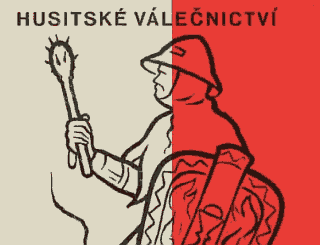
Husitské válečnictví
, 1938

Jaroslav Hašek, Průkopník, 27.3.1918
© VHÚ
Hus is mentioned indirectly through the term Hussite Wars, as part of the conversation between the drunk policemen at Gendarmeriestation Putim.
Background
Hus was a famous Czech theologician, philosopher and eventually Church reformer. He was one of the first who openly criticised the Catholic Church, and he subsequenlty was burned as a heretic. After his death the Hussite movement had a profound impact on the course of Czech history and until this day Hus remains an important national symbol.
The Hussite Wars
The Hussite Wars was a series of conflicts that were played out between 1419 and 1434 in the aftermath of the death of Hus. The Hussite movement rebelled against the Catholic Church and the German-Roman Emperor. These in turn dispatched four crusades against Bohemia that were all repelled. The wars also included conflicts between moderate and radical Hussites where the moderates in the end allied with the Catholics and the Emperor. The radicals centred around Tábor (the so-called Táborité) and were in the beginning led by the famous commander Jan Žižka, and like Hus a Czech national legend.
Hus and Czech nationbuilding
During the fight for Czech independence Hus and the Hussites became an important symbol. The first regiment of České legie (the unit that Hašek served in) was in August 1917 given the name 1. střelecý pluk Jana Husi. Hussite leaders like Jan Žižka, Prokop Holý and King Jiří z Poděbrad also had regiments named after themselves. Jaroslav Hašek also referred to the, in his propaganda writing from 1916 onwards and even after he became a Communist in 1918[a]. The Hussite, specifically the Taborite ideals of equality obviously inspired the communists. In inter-war Czechoslovakia and also during Communist rule the Hussites were still revered. In the current Czech Republic more than 100 street carry his name. If his followers are included the number will reach several hundreds.
Quote(s) from the novel
[II.2] Nakláněje se k uchu strážmistra, šeptal: „Že jsme všichni Češi a Rusové jedna slovanská krev, že Nikolaj Nikolajevič bude příští týden v Přerově, že se Rakousko neudrží, aby jen, až bude dál vyšetřován, zapíral a pletl páté přes deváté, aby to vydržel do té doby, dokud ho kozáci nevysvobodí, že už to musí co nejdřív prasknout, že to bude jako za husitských válek, že sedláci půjdou s cepy na Vídeň, že je císař pán nemocný dědek a že co nejdřív natáhne brka, že je císař Vilém zvíře, že mu budete do vězení posílat peníze na přilepšenou a ještě víc takových řečí...“
Literature
- Mistr Jan Hus, jeho život a dílo, ,1915
- K českému vojsku, Jaroslav Hašek,27.3.1918 [a]
| a | K českému vojsku | Jaroslav Hašek | 27.3.1918 |
 | Butcher Chaura |  | |||
| |||||
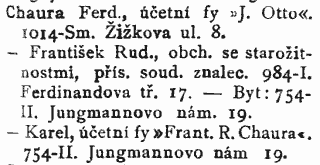
, 1910
Chaura was a butcher from Kobylisy who circled around the statue of Palacký at Moráň, thinking it was an endless wall. This is revealed in a story Švejk tells his guard on the way from Putim to Písek.
Background
Chaura was a rare surname and none of the three that are listed in the address book from 1910 were butchers or from Kobylisy[a]. In 1907 the town had two butchers: Josef Koníček and František Smetana.
Still it can't be ruled out that Hašek knew some Chaura and borrowed his name. One such candidate is the antique trader František Chaura who had his outlet next to c.k. policejní ředitelství (an institution the author of The Good Soldier Švejk knew very well). One further notes that the Palacký monument was unveiled 1 July 1912 so if the story with Chaura has any real backround it must have happened after this date.
Quote(s) from the novel
[II.2] „To byl bych si nikdy nemyslil,“ vykládal Švejk, „že taková cesta do Budějovic je spojena s takovejma vobtížema. To mně připadá jako ten případ s řezníkem Chaurou z Kobylis. Ten se jednou v noci dostal na Moráň k Palackýho pomníku a chodil až do rána kolem dokola, poněvadž mu to připadalo, že ta zeď nemá konce.
Literature
| a | Adresář královského hlavního města Prahy a obcí sousedních | 1910 |
 | Palacký, František |  | |||
| *14.6.1798 Hodslavice - †26.5.1876 Praha | |||||
| |||||
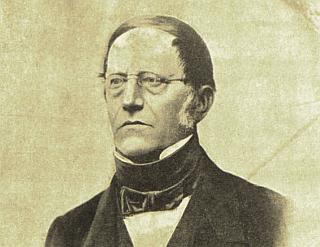
, 12.6.1908
Palacký is mentioned by Švejk in the story about butcher Chaura who walked round the Palacký-monument at Moráň the whole night.
In [III.2] in Budapest he is quoted by Leutnant Dub as follows: "if there weren’t Austria we’d have to create it.
Background
Palacký was a Czech historian and politician who played a pivotal role in the Czech National Revival. He was also called otec národa, the father of the nation. He was loyal to the Empire, initially a proponent of the so-called Austroslavism, although he became more radical after Ausgleich in 1867. Like most Czechs he resented that Hungary achieved a special status within the Habsburg Empire.
The Palacký monument is located on the eastern bank of Vltava, at Palackého náměstí. It was unveiled in 1 July 1912[a] in a grand ceremony, attended by Prague's notabilities.
Quote(s) from the novel
[II.2] „To byl bych si nikdy nemyslil,“ vykládal Švejk, „že taková cesta do Budějovic je spojena s takovejma vobtížema. To mně připadá jako ten případ s řezníkem Chaurou z Kobylis. Ten se jednou v noci dostal na Moráň k Palackýho pomníku a chodil až do rána kolem dokola, poněvadž mu to připadalo, že ta zeď nemá konce.
[III.2] To budou také taková hovada, jako jste vy!... Čím byli?... U trénu?... Nu dobře... Pamatujte, že jste vojáci... Jste Češi?... Víte, že řekl Palacký, že kdyby nebylo Rakousko, že bychom ho musili vytvořit... Abtreten...!“
Literature
- Slavnost odhalení pomníku Palackého, ,1.7.1912 [a]
| a | Slavnost odhalení pomníku Palackého | 1.7.1912 |
 | Rittmeister König |  | ||||
| ||||||
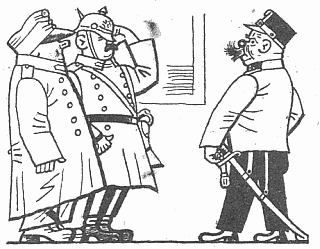
,24.2.1924

Kolský seems to have served diligently, just like König
, 16.11.1918
König was station commander at Bezirksgendarmeriekommando Pisek, and very diligent, an outstanding bureaucrat. “If we want to win the war,” he said, “an ‘a’ must be an ‘a’, a ‘b’ a ‘b’, and everywhere there has to be a dot over the ‘i’.” He received Švejk and correctly sent him south to join his regiment which he for many days had looked for in vain.
Background
König is clearly an invented person, nor would normally a Rittmeister (captain) be in command of a district command. The position in question was in 1915 held by Wachtmeister Antonín Kolský[a]. The chief of the unit they reported to did however have this rank: Rittmeister Rotter.
Quote(s) from the novel
[II.2] A opravdu bylo to hrozné, když strážmistr poslal pro velitele stanice, rytmistra Königa. První slovo rytmistrovo bylo: „Dýchněte na mne.“ „Teď to chápu,“ řekl rytmistr, zjistiv nesporně situaci svým bystrým, zkušeným čichem, „rum, kontušovka, čert, jeřabinka, ořechovka, višňovka a vanilková. Pane strážmistr,“ obrátil se na svého podřízeného, „zde vidíte příklad, jak nemá četník vypadat. Takhle si počínat je takový přečin, že o tom bude rozhodovat vojenský soud. Svázat se s delikventem želízky. Přijít ožralý, total besoffen. Přilézt sem jako zvíře! Sundejte jim to!“
Literature
- Chytilův úplný adresář Království Českého, ,1915 [a]
| a | Chytilův úplný adresář Království Českého | 1915 |
 | Wachtmeister Matějka |  | |||
| |||||
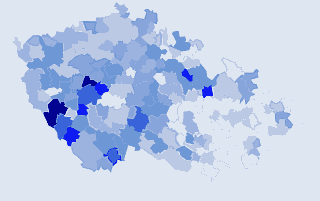
The surname Matějka is and was very common in Bohemia
,2017
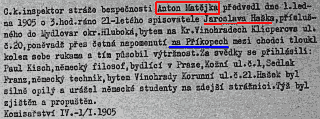
Police report. Hašek arrested after causing trouble on Příkopy 1 January 1905. Translated by Břetislav Hůla.
© LA-PNP
Matějka was master sergeant at Bezirksgendarmeriekommando Pisek. He was keen on getting off for a game of "Schnaps" down by the Otava but Rittmeister König held him back. This annoyed Matějka who thought to himself that the police chief could kiss his arse with all these reports.
Background
has not been possible to identify with respect to a possible real-life model. Neither the address book from 1915 nor the census from 1910 has any policeman Matějka listed in Písek. This should come as no surprise as the Putim to Písek sequence in The Good Soldier Švejk is (in a geographical sense) hardly based on real events or the author's experiences.
The author may however still borrowed the name and assigned it to his fictional policeman. Matějka is a very common surname[a] and we know that several of them served with Jaroslav Hašek in IR. 91 in 1915, amongst them an officer. See Korporal Matějka for more information about them.
A source of inspiration that is far more plausible than some name from IR. 91 is the policeman Anton Matějka. At 3 AM on 1 January 1905 he arrested a drunk and disorderly Hašek at Na Příkopě (Am Graben)[b]. Otherwise the address books and police records of Prague reveal that a large number of Matějkas lived in the city so Hašek could have known a few of them.
Quote(s) from the novel
[II.2] Rytmistr studoval „bericht“ četnického strážmistra z Putimě o Švejkovi. Před ním stál jeho četnický strážmistr Matějka a myslel si, aby mu rytmistr vlezl na záda i se všemi berichty, poněvadž dole u Otavy čekají na něho s partií „šnopsa“.
Credit: Radko Pytlík, Břetislav Hůla
Literature
- Příjmení: 'Matějka', počet výskytů v celé ČR, ,2017 [a]
- Toulavé house, ,1971 [b]
| a | Příjmení: 'Matějka', počet výskytů v celé ČR | 2017 | |
| b | Toulavé house | 1971 |
 | Hercules |  | |||
| |||||

Hercules capturing the three-headed dog Cerberus
Hercules is mentioned indirectly by Rittmeister König when Švejk tells him about his efforts to join his regiment. The term he used was "a Herculian job".
Background
Hercules is the latin name of Heracles, a Greek demigod, son of Zeus, known for his strength. The text in The Good Soldier Švejk refers to the Twelve Labours of Heracles, each and one of them in turn a huge challenge.
Quote(s) from the novel
[II.2] „To byla herkulovská práce,“ řekl konečně, když se zalíbením naslouchal Švejkovu líčení, jak ho to mrzí, že se nemohl tak dlouho dostat k pluku, „na vás musela být mohutná podívaná, když jste se kroutil kolem Putimi.“
Also written:HéraklésczHerculesla
 | Pubkeeper Rampa |  | ||||
| *30.9.1854 Suchodol - †? | ||||||
| ||||||

Z mých vzpomínek na Jaroslava Haška, ,1925
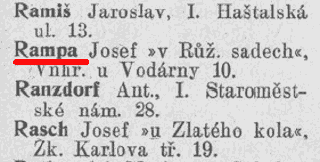
, 1910
Rampa was according to Švejk an elderly pub landlord in Vinohrady who turned a deaf ear when guests wanted to drink on a tab. By this Švejk informed Rittmeister König that there would have been no point in telling Wachtmeister Flanderka his name or what regiment he belonged to.
Background
Rampa (Josef) was a pub landlord that Hašek knew well. Hájek wrote that Rampa managed a pub in Sokolská ulice that was mainly visited by students. He was an elderly widower and his older sister cooked for the students. Rampa was constantly looking for a new wife, and preferably a widow with money. He liked Hašek because the young author took time to listen to him[a]. Rampa was in fact reluctant to let bar guests run up debts. Hájek doesn't say anything about what year(s) he and Hašek frequented Rampa's pub.
Police registers reveal that Rampa was born in 1854 in Suchodol by Příbram, initially married to Marie (born in 1848) and that he from 1892 to 1914 lived at nine different addresses at Vinohrady[b] and six in Praha II. [c]. None of these addresses were in Sokolská but he might not necessarily have lived at the premises of the pub he managed (although this was the norm at the time). His first wife died in 1898 and he later married Josefa (neé Černá). To judge by the police registers she was a widow.
Church records show that Rampa's father also was a pub landlord, at Suchodol No. 9[d].
Rampa also features in the play From Karlín to Bratislava in 365 days, co-written by Jaroslav Hašek, EOL and Egon Erwin Kisch.
Quote(s) from the novel
[II.2] „Proč jste v Putimi neupozornil, že se jedná o omyl?“ „Poněvadž jsem viděl, že je to marný, s ním mluvit. To už říkal starej hostinskej Rampa na Vinohradech, když mu chtěl někdo zůstat dlužen, že přijde někdy na člověka takovej moment, že je ke všemu hluchej jako pařez.“
Credit: Sergey Soloukh
Literature
- Z mých vzpomínek na Jaroslava Haška, ,1925 [a]
- Pobytové přihlášky pražského policejního ředitelství, ,1851 - 1914 [b]
- Pobytové přihlášky pražského policejního ředitelství, ,1851 - 1914 [c]
- Pičín (Římskokatolická církev), ,1850-1871 [d]
- Oznámení, ,26.11.1893
- Smichover Actien-Bier, ,19.11.1898
- Hostinec, ,19.11.1898
- Oznámení, ,1.4.1900
- Pan Josef Rampa, ,15.11.1905
- Otevření hostince, ,28.11.1906
- Die Reise um Europa in 365 Tagen, ,1921
| a | Z mých vzpomínek na Jaroslava Haška | 1925 | |
| b | Pobytové přihlášky pražského policejního ředitelství | 1851 - 1914 | |
| c | Pobytové přihlášky pražského policejního ředitelství | 1851 - 1914 | |
| d | Pičín (Římskokatolická církev) | 1850-1871 |
 | Fähnrich Koťátko |  | ||||
| ||||||
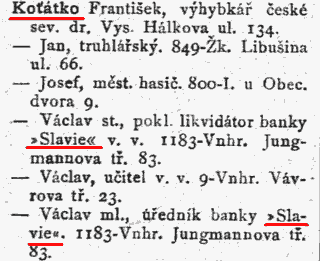
, 1910
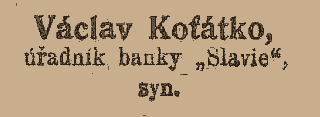
Death of Václav Koťátko Sr.
, 11.11.1912

, 29.10.1913
Koťátko was a junior officer in Infanterieregiment Nr. 91 who witnessed Švejk's appearance at Mariánská kasárna in Budějovice, and watched Oberleutnant Lukáš passing out as a result of seeing his servant again. Later he related about the incident, for instance that Švejk saluted during the whole sequence.
Background
In IR. 91 there is no trace of any Koťátko, whether it be in Schematismus, Verlustliste or other available military documents. The surname was moreover virtually non-existent in the regiment's recruitment area[f].
The inspiration for the name is thus more likely to be found in civilian life and the name indeed appears in Hašek's pre-war writing. In Strana mírného pokroku v mezích zákona he mentions a certain judge Koťátko[a] and he also wrote a story featuring the postal official Koťátko from Rokycany[b].
Banka Slavia
They name may well have been borrowed from Václav Koťátko, one or even two men that Hašek surely knew. These two Václav's were father and son, born in 1852 and 1881 respectively, lived in the same house at Vinohrady and both worked at Banka Slavia (where Hašek was employed in 1902 and 1903)[c][d]. Václav jr. must also have been a Fähnrich at some stage because in 1916 he held the rank of Oberleutnant.
A judge in Strakonice
One judge Koťátko did indisputably live and work at the time. This man was Jan Koťátko who from 1905 worked at the district court in Strakonice[e]. Whether or not this person had anything to do with Strana mírného pokroku v mezích zákona is pure guesswork, but Hašek's judge Koťátko was amongst those who spread the word of the "party" in the countryside[a] so perhaps the connection has some substance.
An apprentice lawyer
Antonín Koťátko is also a person who may, at a push, be the judge from Strana mírného pokroku v mezích zákona. In 1906 he was an apprentice lawyer who lived in Balbinova ulice at Vinohrady[g]. In this street the pub U zlatého litru was located, the place where the "party" allegedly was founded.
Quote(s) from the novel
[II.2] U celé té scény byl praporčík Koťátko, který později vypravoval, že po tom hlášení Švejkově nadporučík Lukáš vyskočil, chytil se za hlavu a upadl naznak na Koťátko, a že když ho vzkřísili, Švejk, který po celou tu dobu vzdával čest, opakoval: „Poslušně hlásím, pane obrlajtnant, že jsem opět zde!“
Literature
- Jiná organizační střediska nové strany, [a]
- Jak se vzbouřili roku 1912 veteráni v Rokycanech, Jaroslav Hašek,27.2.1912 [b]
- Pobytové přihlášky pražského policejního ředitelství, ,1851 - 1914 [c]
- Pobytové přihlášky pražského policejního ředitelství, ,1851 - 1914 [d]
- Příjmení: 'Koťátko', počet výskytů v celé ČR, ,2017 [f]
- Adresář královského hlavního města Prahy a obcí sousedních Sv. 2, ,1907 [g]
| a | Jiná organizační střediska nové strany | ||
| b | Jak se vzbouřili roku 1912 veteráni v Rokycanech | Jaroslav Hašek | 27.2.1912 |
| c | Pobytové přihlášky pražského policejního ředitelství | 1851 - 1914 | |
| d | Pobytové přihlášky pražského policejního ředitelství | 1851 - 1914 | |
| e | 18.12.1905 | ||
| f | Příjmení: 'Koťátko', počet výskytů v celé ČR | 2017 | |
| g | Adresář královského hlavního města Prahy a obcí sousedních Sv. 2 | 1907 |
 | Einjährigfreiwilliger Materna, František |  | ||||
| ||||||

, 1910

, 1851-1914
Materna was a one-year volunteer and an acquaintance of Einjährigfreiwilliger Marek. The latter mistook Materna for an artillery officer, knocked this lieutenant's cap off as a friendly gist, but this proved a costly mistake. He was now sharing a cell with Švejk. Moreover the episode led to Marek's expulsion from the reserve officer's school.
Background
A certain František Materna was owner of U Valšů (address book from 1910) and hence a person Jaroslav Hašek surely knew, and might thus have served as an inspiration. Whether or not this Materna was a one-year volunteer and served in Budějovice in 1915 has not yet been established but is very unlikely. According to police registers the landlord at U Valšů was born in 1872[c] and was thus too old to have been called up this early in the war. His Heimatrecht was in Račiněves north of Prague so he would not be expected to serve with any of the units garrisoned in South Bohemia. The records also revealed that he managed U Valšů from 1908 and that before that he was landlord at a pub at Karlovo námměstí, an area that Hašek frequented a lot, further strenghtening the hypothesis that Hašek knew him.
Moreover four person with this combination of names and surnames were listed in the addressbook for Prague in 1910 so there is no base for any firm conclusion. Materna is anyway probably yet another example of Hašek merely borrowing a name.
The surname in itself is fairly widespread but is rare in the recruitment area of IR91[a]. Still that in itself might not mean much as one-year volunteers could to a degree choose in which unit they wanted to serve. In Infanterieregiment Nr. 91 three Materna are registered in the loss list[b], they were all Gefreiter and might have been one year volunteers. None of them however bore the first name František.
Quote(s) from the novel
[II.2] Stalo se to tak, že ten poručík od dělostřelectva stál v noci pod podloubím a patrně čekal na nějakou prostitutku. Byl obrácen k němu zády a jednoročnímu dobrovolníkovi připadal, jako by to byl jeho jeden známý jednoročák, Materna František.
Literature
- Příjmení: 'materna', počet výskytů v celé ČR, ,2017 [a]
- Seznamy ztrát - 91. pěší pluk, ,2021 [b]
- Pobytové přihlášky pražského policejního ředitelství, ,1851 - 1914 [c]
- Soupis pražských domovských příslušníků 1830-1910 (1920),
| a | Příjmení: 'materna', počet výskytů v celé ČR | 2017 | |
| b | Seznamy ztrát - 91. pěší pluk | 2021 | |
| c | Pobytové přihlášky pražského policejního ředitelství | 1851 - 1914 |
 | Leutnant Anton |  | |||
| |||||

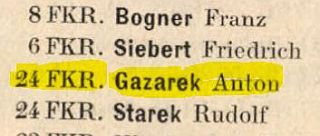
, 1916
Anton was the artillery officer that Einjährigfreiwilliger Marek knocked the cap off at Budějovické náměstí because he thought the officer was his friend Einjährigfreiwilliger Materna.
Background
Because Einjährigfreiwilliger Marek in The Good Soldier Švejk is assigned details and events that to a degree hail from Hašek one can easily imagine that the author was involved in some incident with an artillery officer. In this case he would have been from Feldkanonenregiment Nr. 24 who were garrisoned in Budějovice. According to Schematismus there was in 1914 one single person with first name Anton amongst the officers: Fähnrich Anton Gaksch[a]. In Rangliste from 1916 he is no longer listed, and the reason seems to be that he was killed in action in the meantime[c]. On the other hand a Leutnant Anton Gazarek had joined the regiment, until 1 June 1916 Fähnrich[b].
Thus none of them had the rank of the officer that Einjährigfreiwilliger Marek clashed with and the first was even dead when Hašek enlisted with Infanterieregiment Nr. 91 in Budějovice on 17 February 1915. It is therefore tempting to suggest that the name Anton and his rank were picked more or less at random.
Incident on the tramway
Another version of the story appeared in a newspaper article in 1963[d]. According to this narrative the episode happened in the tramway and involved an unidentified high-ranking officer. The officer had the tramway stop, called a patrol and Hašek was arrested on the spot.
Quote(s) from the novel
[II.2] Napohlavkoval omylem jednomu poručíkovi od dělostřelectva v noci na náměstí v podloubí v opilém stavu.
[II.2] Může být,“ připouštěl jednoroční dobrovolník, „že při té tahanici padlo pár pohlavků, ale to myslím nic na věci nemění, poněvadž je to vyložený omyl. On sám přiznává, že jsem řekl: ,Servus, Franci’ a jeho křestní jméno je Anton. To je úplně jasné. Mně snad může škodit jenom to, že jsem utekl z nemocnice, a jestli to praskne s tím ,krankenbuchem’...
Literature
- Schematismus für das k.u.k. Heer (s. 810), ,1914 [a]
- Ranglisten des Kaiserlich und Königlichen Heeres (s. 695), ,1916 [b]
- Vor dem Feinde gefallenen, ,4.2.1915 [c]
- Pátrání po stopách Haškovy českobudějovické anabáze, Vladimír Michal,20.10.1963 [d]
| a | Schematismus für das k.u.k. Heer (s. 810) | 1914 | |
| b | Ranglisten des Kaiserlich und Königlichen Heeres (s. 695) | 1916 | |
| c | Vor dem Feinde gefallenen | 4.2.1915 | |
| d | Pátrání po stopách Haškovy českobudějovické anabáze | Vladimír Michal | 20.10.1963 |
 | Doctor Masák |  | ||||
| ||||||
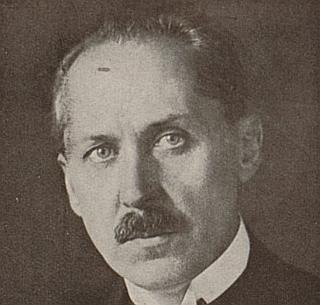
MUDR. Jan Masák
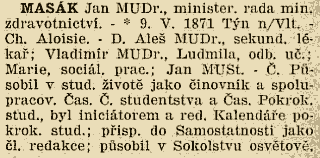
Kulturní adresář ČSR, 1936
Masák was a doktor from Žižkov, brother-in-law of Einjährigfreiwilliger Marek. The doctor helped him prolong his stay at Budějovická nemocnice.
Background
Any obvious inspiration for this medic has not been identified. Hašek's chief doctor at the hospital in Budějovice was Peterka, he was not Žižkov, nor was he Hašek's brother-in-law. It is claimed that Peterka was sympathetic to Hašek, that he turned a blind eye to his disappearances from the hospital, and that he did his best to prolong the hospitalisation. It was Peterka who signed the application for superarbitration on behalf of Hašek 8 April 1915.
MUDR. Masák
Although there is no clear link to any dr. Masák in Hašek's own milieu in Budějovice, it is entirely possible and indeed likely that he borrowed the name from Jan Masák, a medical doctor who actually lived in Žižkov from 1900 until he died in 1936. He was a actually a dentist, active in society and also chairman of the Žižkov branch of Sokol from 1907 to 1922. It is therefore likely that Hašek at least knew who he was.
At first sight it seems interesting that he was from Týn nad Vltavou, a town in the recruitment district of Infanterieregiment Nr. 91. That said we have not seen any evidence that he was ever associated with the regiment, nor that he was called up during World War I.
Masák was born in Týn nad Vltavou 9 May 1871[a], studied in Budějovice, and settled in Žižkov around 1900[a] where set up a dental practice. In 1919 he was appointed minister councillor at the Department of Health, specialising in gymnastics. At the time when Hašek wrote the first part of The Good Soldier Švejk in Žižkov in 1921, Masák lived in nearby Prokopova ul. 150/2[b]. He died 1 October 1936 in Prague.
Quote(s) from the novel
[II.2] Do Budějovic byl přeložen můj pošvagřenec Dr Masák ze Žižkova a tomu mohu děkovat, že jsem se tak dlouho v nemocnici udržel. Byl by to se mnou dotáhl až k supravisitě, když jsem to ale tak zkazil s tím nešťastným ,krankenbuchem’!
Literature
- Pobytové přihlášky pražského policejního ředitelství, ,1851 - 1914
- Chytilův adresář hl. města Prahy, ,1924 [b]
- Kulturní adresář ČSR, ,1936 [a]
- Bratr MUDr. Jan Masák, ,8.10.1936
| a | Kulturní adresář ČSR | 1936 | |
| b | Chytilův adresář hl. města Prahy | 1924 |
 | Icarus |  | |||
| |||||

Icarus is mentioned by Einjährigfreiwilliger Marek when he tells Švejk about his various misadventures and concludes "Pride precedes the fall".
Background
Icarus is a character in Greek mythology. He is the son of Daedalus and is commonly known for his attempt to escape Crete by flight. He stuck wings to his body by wax, but was warned not to fly too close to the sun. Due to his pride and complacency he ignored the advice with the result that the wax melted, the wings fell off and he fell in the sea and drowned.
Quote(s) from the novel
[II.2] Pýcha předchází pád. Všechna sláva polní tráva. Ikarus si spálil křídla. Člověk by chtěl být gigantem - a je hovno, kamaráde.
Also written:Ikaroscz
 | Oberst Schröder |  | ||||
| ||||||
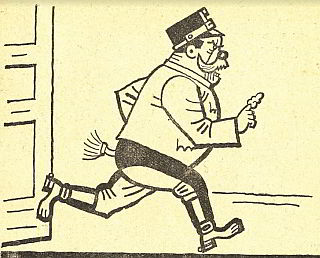
,13.4.1924
Schröder is mentioned 46 times in The Good Soldier Švejk.
Schröder was a colonel and commander of Švejk's regiment in Budějovice and Bruck and plays a prominent role in the four chapters where the action takes place in those places. He is described as a bully and a swine but the author later assigns him a partial sense of justice. His incompetence is never in doubt, a distinction he shares with most officers in the regiment. He doesn't like reserve officers and not even Major Wenzl. There is nothing that he fears more than being dispatched to the front.
In [II.4], during the investigation into the letter scandal in Királyhida, he is more kindly treated by the author. It becomes clear that he defends his own men, also the Czechs. He clearly doesn't like Hungarians and it is evident that he has previously served in Hungary. Eger is specifically mentioned as he had attended a telemetry course there and had incredible success amongst the female population (his own words). In a conversation with Oberleutnant Lukáš he revealed that he had served on the front against Serbia by Belgrade.
Schröder appreciated Švejk's courage and loyalty when he swallowed the letter Oberleutnant Lukáš wrote Etelka Kakonyi and thus protected his obrlajtnant. Then he personally named the good soldier company messenger. Schröder disappears from the plot when the march battalion departs for the front.
Parts of the information we have about Schröder comes from Einjährigfreiwilliger Marek telling Švejk about life within the regiment and the mood in the unit. This happened when the two shared a cell in the garrison prison in Budějovice.
Background
The literary character Schröder was indeed inspired by a real person but he remained unidentified for years. According to Bohumil Vlček Schröder was commander of Ersatzbataillon IR. 91 in Budějovice and then for a short period in Bruck an der Leitha [a]. This fits well with the novel, but it is evident that Vlček mixed up names. The officer who was in charge of the replacement battalion at the time was Oberst Karl Schlager.
Quote(s) from the novel
[II.2] To zas má náš obrst Schröder pěknou radost. Nedovedete si ani představit, jak na něho účinkují plukovní aféry. Lítá po dvoře jako pominutý hafan a vysunuje jazyk jako mrcha kobyla.
[II.2] Obrst Schröder přijel na mne přímo na koni a div mne nepovalil na zem. ,Donnerwetter,’ zařval, až to bylo slyšet jistě na Šumavě, ,was machen Sie hier, Sie Zivilist?’ Odpověděl jsem mu slušně, že jsem jednoroční dobrovolník a že se zúčastňuji cvičení.
[II.2] Plukovník Schröder nemá rád majora Wenzla. Je to vůbec divný pavouk. Hejtman Ságner, který má na starosti školu jednoročních dobrovolníků, vidí v Schröderovi pravý typ vojáka, ačkoliv plukovník Schröder nebojí se ničeho tak jako toho, kdyby měl jít do pole. Ságner je chlap všemi mastmi mazaný a stejně jako Schröder nemá rád reservní důstojníky.
[II.2] Plukovník Schröder v mrzuté náladě odešel domů, a když se ráno probudil, měl ještě horší náladu, poněvadž v novinách, které četl v posteli, několikrát našel větu ve zprávách z bojiště, že vojska byla odvedena na předem již připravené posice. Byly to slavné dny rakouské armády, podobající se jako vejce vejci dnům u Šabace.
[II.4] Plukovník Schröder se zalíbením pozoroval bledý obličej nadporučíka Lukáše, s velkými kruhy pod očima, který v rozpacích nedíval se na plukovníka, ale úkradkem, jako by něco studoval, díval se na plán dislokace mužstev ve vojenském táboře, který byl také jedinou ozdobou v celé kanceláři plukovníka.
[II.5] Od té doby, kdy mu oznámil plukovník Schröder, že mu opět pošle Švejka na krk, nadporučík Lukáš si v duchu každý den oddaloval ono setkání.
Credit: Bohumil Vlček, VÚA, ÖStA
Literature
- Vojenské figury, ,20.3.1956 [a]
| a | Vojenské figury | 20.3.1956 |
 | Einjährigfreiwilliger Wohltat |  | |||
| |||||
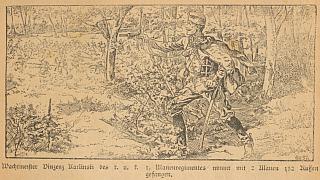
This text partly associates with cadet Wohltat.
Wohltat was a soldier who was a prime examples of courage. Oberst Schröder bellowed that he was the straight opposite of Einjährigfreiwilliger Marek when the latter turned up first time at the exercise ground clad in high boots and a bowler hat.
Wohltat was promoted to Korporal after finishing at the reserve officer's school, volunteered for service at the front where he captured 15 enemy soldiers. In the end a grenade tore him to pieces and five minutes later arrived an order that he was promoted to Kadett.
Background
Wohltat is not doubt an invented "joke name" (it means "good deed") and thus joins names as Feldwebel Sondernummer and Siegfried von Busenthal. In the name database of familysearch.org only 3 such persons are listed (all in Germany) and other searches show no hits at all.
Despite the name being thought up one can still assume that the heroic deeds assigned to Wohltat were inspired by something Hašek picked up from propaganda material, for instance from Kriegskalender (war calendar). These could contain descriptions that were similar to that of Wohltat and we know that the author inserted fragments from the 1919 issue into the novel.
Quote(s) from the novel
[II.2] Jednoroční dobrovolník Wohltat, byv po odbyté zkoušce povýšen na kaprála, dobrovolně přihlásil se na frontu a zajal 15 nepřátel a při odevzdávání jich byl roztržen granátem. Za pět minut došel pak rozkaz, že jednoroční dobrovolník Wohltat je povýšen na kadeta.
 | Saint Agnes |  | |||
| *20.1.1211 Praha? - †6.3.1282 Praha | |||||
| |||||

, 1894
Saint Agnes was used ironically by Einjährigfreiwilliger Marek when he addressed the guard contemptuously as "Saint Agnes of the 91st Regiment".
Background
Saint Agnes may refer to a daughter of king Otakar I. of Bohemia who renounced a life in the circles of power and dedicated herself to religion and caring for the ill. There are however several other Saint Agnes around, so it is not 100 per cent certain that this is the person Einjährigfreiwilliger Marek has in mind.
Quote(s) from the novel
[II.2] Aniž by vstal ze slamníku, oslovil jednoroční dobrovolník profousa touto řečí: „Jak jest to vznešené a krásné, vězně navštěvovati, svatá Anežko 91. regimentu! Buď vítán, anděli dobročinnosti, jehož srdce jest naplněno soucitem.
Also written:Svatá AnežkaczHeilige AgnesdeSt. Agnesnn
Literature
 | Kriegsminister von Krobatin, Alexander |  | |||
| *2.9.1849 Olomouc - †27.12.1933 Wien | |||||
| |||||
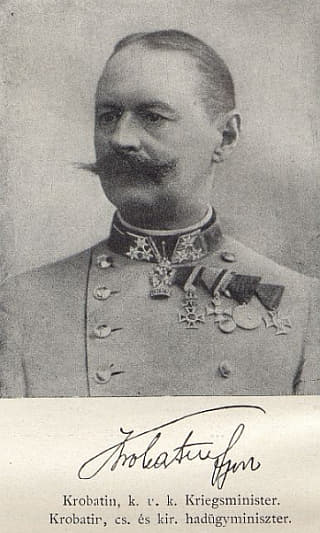
, 1916
Kriegsminister is mentioned by Einjährigfreiwilliger Marek as he argues with the profous in the cell at Mariánská kasárna. The prison guard is told that he would have had a terrible war if Marek happened to be minister of war.
Background
The minister of war served as the political head of the k.u.k. Kriegsministerium (Ministry of War). Minister from 1912 until 1917 was Alexander von Krobatin (1849-1933). He was regarded as one of the hawks as he wanted to settle scores with Serbia at the slightest pretext.
Krobatin had a background in artillery, had studied chemistry and was regarded as an expert on munitions. During the war he was, as minister, tasked with transitioning the economy to war production, a task that he in manys opinion didn't do well. In 1917 he resigned as minister and was named commander of 10. Armee, a unit that was fighting against Italy. Here he was far more successful (Wikipedia), particularly during the 12th battle of Isonzo, also known as the Caporetto offensive.
Quote(s) from the novel
[II.2] Zavřel bys jich dvacet a deset pustil, sysle. Ježíšmarjá, já být ministrem vojenství, ty bys měl u mě vojnu!
Literature
- Alexander von Krobatin,
- Alexander Freiherr von Krobatin, ,2001 - 2016
 | Pushkin, Alexandr |  | ||||
| *6.6.1799 Moskva - †10.2.1837 Sankt Petersburg | ||||||
| ||||||

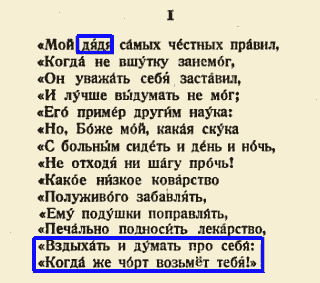
The first verse of "Eugene Onegin".
Pushkin is mentioned by Einjährigfreiwilliger Marek who compares the monarchy to Pushkin's uncle who has as good as become a carcass.
Background
Pushkin (Пушкин) was a Russian novelist, poet and playwright of the Romantic era who is considered by many to be the greatest Russian poet ever and the founder of modern Russian literature.
Eugene Onegin
Both Sergey Soloukh og Antonín Měšťan point out that "Pushkin's uncle" no doubt refers to fragments from Eugen Onegin[e][a], a novel on verse that was published as a series in the early 19th century. Already in the first verse there is a scene where Onegin is waiting for his ill and rich uncle to die so he can inherit him[b].
Einjährigfreiwilliger Marek even quotes the last two lines of this verse, and it seems to be a literal translation from Russian rather than a more elaborate Czech translation.
Numerous translation into English exist, at least 45 if fragments are counted. The first appeared in 1881[c].
Quote(s) from the novel
[II.2] „Milý příteli,“ vykládal dál, „pozorujeme-li to všechno v měřítku naší milé monarchie, dospíváme neodvolatelně k tomu závěru, že je to s ní právě tak jako se strýcem Puškina, o kterém ten napsal, že nezbývá jen, poněvadž strýc je chcíplotina,vzdychat i myslet pro sebe, kdypak čert vezme tebe!“
Credit: Sergey Soloukh, Antonín Měšťan
Also written:PuškinczPuschkinde
Literature
- Швейк. Комментарии. Шаг 50, ,14.1.2012 [a]
- ЕВГЕНИИ ОНЕГИН Роман в стихах, ,1945 [b]
- Realien und Pseudorealien in Hašeks "Švejk", ,1983 [e]
- English Versions of Pushkin’s Eugene Onegin, ,2010-2016 [c]
- Jevgenij Onegin, Jostein Børtnes [d]
| a | Швейк. Комментарии. Шаг 50 | 14.1.2012 | |
| b | ЕВГЕНИИ ОНЕГИН Роман в стихах | 1945 | |
| c | English Versions of Pushkin’s Eugene Onegin | 2010-2016 | |
| d | Jevgenij Onegin | Jostein Børtnes | |
| e | Realien und Pseudorealien in Hašeks "Švejk" | 1983 |
 | Publisher Kočí, Bedřich |  | ||||
| *7.3.1869 Mladá Boleslav - †17.1.1955 Praha | ||||||
| ||||||
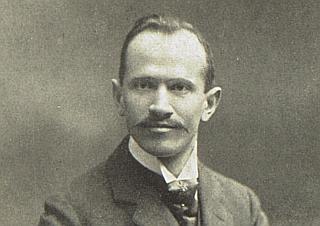
, 28.2.1913
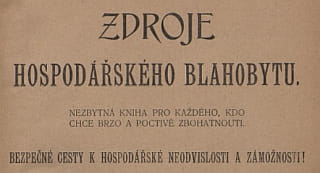
Kočí published the book Zdroje hospodářského blahobytu (Sources of economic prosperity) that Einjährigfreiwilliger Marek refers to when he describes the language that Korporal Althof, Gefreiter Müller and Feldwebel Sondernummer from the 11. Kompanie employ towards Czech recruits. As terms of abuse they pick animal names that could easily have been from this book.
Background
Kočí was a Czech publisher, book trader and author who often wrote using pseudonyms. Today he is best known for theosophical writing and his work on mental health.
The book that Einjährigfreiwilliger Marek mentions was published in 1906 and contains 910 pages[a]. It is an encyclopaedia covering forestry, animal breeding, sugar growing, poultry and a range of other subjects. It was written by a range of contributors, each covering specific subjects. Editor was Karel Ladislav Kukla[b].
The book actually does contain descriptions of two of the three animals that are used as expletives by the junior officers in 11. Kompanie. These are "Yorkshire boar" and "Engadin goat". The bullfrog is not mentioned but it can hardly be classed as a source of economic wealth. The omission is therefore understandable.
The Good Soldier Švejk in Captivity
The theme around the zoological swearwords that were taken from Sources of economic prosperity is also found in Dobrý voják Švejk v zajetí, and in quite similar wording. Moreover, the users of the expletives are the same: Korporal Althof, Feldwebel Sondernummer, and Gefreiter Müller. The only difference is that the abuse took place in Királyhida and not in Budějovice.[1]
První den v baráku vojenského tábora v Brucku nad Litavou zdálo se mu, že všichni představení, kteří chodili zamračeně kolem staronových nováčků, z nichž se měl vytřískat nový válečný materiál a vojensky uvědomělá sousta pro jícny děl, museli studovat buď přírodopis, nebo u Kočího v Praze vydanou objemnou knihu Zdroje hospodářského blahobytu.
Quote(s) from the novel
[II.2] Vytřískat nový válečný živý materiál a vojensky uvědomělá sousta pro jícny děl, k tomu je třeba důkladných studií přírodopisu nebo knihy ,Zdroje hospodářského blahobytu’, vydané u Kočího, kde vyskytuje se na každé stránce slovo: dobytek, prase, svině.
Literature
- Zdroje hospodářského blahobytu, ,1906 [a]
- Zdroje hospodářského blahobytu, ,14.4.1907 [b]
- Dobrý voják Švejk v zajetí, ,1917 [1]
| a | Zdroje hospodářského blahobytu | 1906 | |
| b | Zdroje hospodářského blahobytu | 14.4.1907 | |
| 1 | Dobrý voják Švejk v zajetí | 1917 |
 | Korporal Althof |  | ||||
| ||||||

Korporal Althof may well have picked his swear-word from this book.
Zdroje hospodářského blahobytu, , 1906
Althof was a junior officer from 11. Kompanie who used the innovative swearing expression "you Engadin Goat" towards the recruits. According to Einjährigfreiwilliger Marek the terms of abusive were as picked from Zdroje hospodářského blahobytu (Sources of economic prosperity) by publisher Kočí.
Althof and Gefreiter Müller also talked between themselves about slapping Landsturm recruits across the ear(ein paar Ohrfeigen). In the conversation Althof also used the expressions "Czech pig".
Background
It is unlikely that Althof has any real life model although some brutal junior officer in Infanterieregiment Nr. 91 may have been a source of inspiration. The surname is very rare and most widespread in Nordrhein-Westfalen and Netherlands. In Czechia lived in 2021 only one person with this surname[a]. Nor in Verlustliste or Schematismus is there any indication that any Althof served in IR. 91[b].
The name Althof may be invented but the term of abuse that he employed is real enough. The Engadin goat is actually described in the book Zdroje hospodářského blahobytu from publisher Kočí that Einjährigfreiwilliger Marek refers to, albeit misspelt as Engandin goat[d].
Incident by Sokal
According to Bohumil Vlček Hašek was at the receiving end of the type of abuse that Althof subjected recruits to. During the battle by Sokal Hašek was a messenger and together with Vlček he was once sent to regimental headquarters to fetch ammunition. However, they mistakenly ended up at Feldjägerbataillon Nr. 10, the so-called Kopaljäger, a unit that was recruited from Jihlava and surroundings, a predominantly German-speaking area. Hašek addressed a German Oberleutnant but the two misunderstood each other and the officer swore at the messenger and called him a Sauböhm (Czech rabble). The case was brought to Hašek's battalion commander Čeněk Sagner who in the end received an apology on behalf of his messenger. Hašek was still unimpressed and uttered vyseru na jägry (I'll shit on jägry) [c].
The Good Soldier Švejk in Captivity
The theme around the zoological swearwords that were taken from Sources of economic prosperity is also found in Dobrý voják Švejk v zajetí, and in quite similar wording. Moreover, the users of the expletives are the same: Althof, Feldwebel Sondernummer, and Gefreiter Müller. The most important difference is that the abuse took place in Királyhida and not in Budějovice. Althof here participates directly in the plot swore at AVE using the term "Engadin goat". He is mentioned altogether 9 times.[1]
Kaprál Althof, který byl představeným oddělení, kde Švejk měl v prachu baráku svůj kavalec, nazval ho hned dopoledne, krátce po přibytí a roztřídění nových domobranců, engadinskou kozou, svobodník Müller, německý učitel z Kašperských hor, českým smraďochem a šikovatel Sondernummer volskou žábou, vepřovým dobytkem a vyjádřil se, že ho vydělá...
Quote(s) from the novel
[II.2] U 11. kompanie kaprál Althof používá slova: engadinská koza. Svobodník Müller, německý učitel z Kašperských Hor, nazývá nováčky českými smraďochy, šikovatel Sondernummer volskou žábou, yorkshirským kancem a slibuje přitom, že každého rekruta vydělá.
[II.2] Jednou jsem slyšel rozhovor svobodníka Müllera s kaprálem Althofem, týkající se dalšího postupu při výcviku domobranců. V tomto rozhovoru vynikala slova jako: ein paar Ohrfeigen.
[II.2] ,Když takové české prase', poučoval rozšafně kaprál Althof, ’nenaučí se ani po třiceti ,nieder’ stát rovně jako svíčka, nestačí mu jen dát pár přes hubu.
Literature
- Příjmení: 'Althof', počet výskytů v celé ČR, ,2017 [a]
- Seznamy ztrát - 91. pěší pluk, ,2021 [b]
- Připomínky k románu "Dobrého vojáka Švejka", ,20.3.1956 [c]
- Zdroje hospodářského blahobytu, ,1906 [d]
- Althof name meaning, ,2024
- Althof Surname, ,2012 - 2022
- Dobrý voják Švejk v zajetí, ,1917 [1]
 | Gefreiter Müller |  | ||||
| ||||||

The proverbial needle in the haystack: Even in 2021 the surname Müller is very common in Czechia.
,2017
Müller was a lance corporal in 11. Kompanie who called the recruits "Czech stinkbags". He was a German from Kašperské Hory, teacher in civilian life.
Korporal Althof and Müller also talked between themselves about slapping Landsturm recruits across the ear (ein paar Ohrfeigen).
Background
Identifying an inspiration for this person is difficult because Müller is the most common surname in the entire German-speaking world and is also widespread in the Czech Republic[a]. Only in Verlustliste for IR. 91 there are 111 entries of whom 8 held the rank Gefreiter. Five Müllers were reported missing together with Jaroslav Hašek after the battle of Chorupan but these were all rank and file soldiers[b].
Predictably none of the 111 on Verlustliste were from Kašperské Hory. This is explained by the fact that Infanterieregiment Nr. 91 did not recruit from there as it lay within the recruitment district of Infanterieregiment Nr. 11. Germans serving in IR91 would most likely hail from hejtmanství Kaplice or Krumlov, areas that in 1915 were predominantly German speaking.
The Good Soldier Švejk in Captivity
The theme around the zoological swearwords that were taken from Sources of economic prosperity is also found in Dobrý voják Švejk v zajetí, and in quite similar wording. Moreover, the users of the expletives are the same. The difference is mainly that the abuse took place in Királyhida (not in Budějovice) and that Korporal Althof, Feldwebel Sondernummer and Müller are take part in the plot as Švejk's counterparts. They all reported to Fähnrich Dauerling. Like in the novel Müller is a teacher from Kašperské Hory.[1]
Kaprál Althof, který byl představeným oddělení, kde Švejk měl v prachu baráku svůj kavalec, nazval ho hned dopoledne, krátce po přibytí a roztřídění nových domobranců, engadinskou kozou, svobodník Müller, německý učitel z Kašperských hor, českým smraďochem a šikovatel Sondernummer volskou žábou, vepřovým dobytkem a vyjádřil se, že ho vydělá.
Quote(s) from the novel
[II.2] U 11. kompanie kaprál Althof používá slova: engadinská koza. Svobodník Müller, německý učitel z Kašperských Hor, nazývá nováčky českými smraďochy, šikovatel Sondernummer volskou žábou, yorkshirským kancem a slibuje přitom, že každého rekruta vydělá.
[II.2] Jednou jsem slyšel rozhovor svobodníka Müllera s kaprálem Althofem, týkající se dalšího postupu při výcviku domobranců. V tomto rozhovoru vynikala slova jako: ein paar Ohrfeigen.
Literature
- Příjmení: 'Müller', počet výskytů v celé ČR, ,2017 [a]
- Seznamy ztrát - 91. pěší pluk, ,2021 [b]
- Dobrý voják Švejk v zajetí, ,1917 [1]
| a | Příjmení: 'Müller', počet výskytů v celé ČR | 2017 | |
| b | Seznamy ztrát - 91. pěší pluk | 2021 | |
| 1 | Dobrý voják Švejk v zajetí | 1917 |
 | Feldwebel Sondernummer |  | ||||
| ||||||
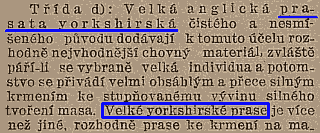
Feldwebel Sondernummer may well have picked one of his swear-words from this book.
"Zdroje hospodářského blahobytu", , 1906
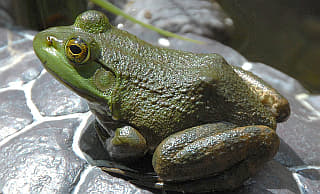
American bullfrog (Lithobates catesbeianus)
Sondernummer was a sergeant in 11. Kompanie who used to address the recruits as "bullfrogs" and "Yorkshire boars". He also promised to flay and stuff them. According to Einjährigfreiwilliger Marek the terms of abuse were as picked from Zdroje hospodářského blahobytu (Sources of economic prosperity) by publisher Kočí.
Another of this favourite swearwords was Saubande (bunch of swine) but here he always added "Czech" in order not to insult the German recruits.
Background
The name Sondernummer (Special number) is clearly no more than a witty invention. It is therefore no suprise that it is absent from military documents like Schematismus and also Verlustliste for IR. 91[a]. Nor is it found in family name databases like Forebears[c].
Event though the name Sondernummer is invented his terms of abuse are real enough. The word Yorkshire-pig appears many times in the book that Einjährigfreiwilliger Marek mentions[b] and the bullfrog lives in many parts of the world, particularly in North America.
The Good Soldier Švejk in Captivity
The theme around the zoological swearwords that were taken from Sources of economic prosperity is also found in Dobrý voják Švejk v zajetí, and in quite similar wording. The main difference is that the abuse took place in Királyhida and not in Budějovice. Sondernummer is also directly part of the plot and is Švejk's superior, reporting to Fähnrich Dauerling. He is mentioned 11 times and he called Švejk a "bullfrog".[1]
Kaprál Althof, který byl představeným oddělení, kde Švejk měl v prachu baráku svůj kavalec, nazval ho hned dopoledne, krátce po přibytí a roztřídění nových domobranců, engadinskou kozou, svobodník Müller, německý učitel z Kašperských hor, českým smraďochem a šikovatel Sondernummer volskou žábou, vepřovým dobytkem a vyjádřil se, že ho vydělá.
Quote(s) from the novel
[II.2] U 11. kompanie kaprál Althof používá slova: engadinská koza. Svobodník Müller, německý učitel z Kašperských Hor, nazývá nováčky českými smraďochy, šikovatel Sondernummer; volskou žábou, yorkshirským kancem a slibuje přitom, že každého rekruta vydělá.
[II.2] Jestli šikovatel Sondernummer mluví cosi o "saubande", přidá vždy k tomu rychle ,die tschechische’, aby se Němci neurazili a nevztahovali to na sebe.
Literature
- Seznamy ztrát - 91. pěší pluk, ,2021 [a]
- Zdroje hospodářského blahobytu, ,1906 [b]
- Sondernummer Surname, ,2012 - 2022 [c]
- Dobrý voják Švejk v zajetí, ,1917 [1]
| a | Seznamy ztrát - 91. pěší pluk | 2021 | |
| b | Zdroje hospodářského blahobytu | 1906 | |
| c | Sondernummer Surname | 2012 - 2022 | |
| 1 | Dobrý voják Švejk v zajetí | 1917 |
 | Fähnrich Dauerling, Konrad |  | ||||
| ||||||

A book that Dauerling read but hardly absorbed
Dauerling is mentioned 22 times in The Good Soldier Švejk.
Dauerling is never part of the plot, but is described by Einjährigfreiwilliger Marek as a particularly stupid and brutal ensign. He got a knock on his head when he was little and his mental horizon had suffered ever since.
According to Marek this made him perfectly suitable for a military career, and the fact that his father was a colonel pre-determined his destiny. He had attended Hainburger Kadettenschule, where he distinguished himself through his gross stupidity, and when the war started he arrived at Infanterieregiment Nr. 91 in Budějovice as an instructor. There he became notorious for his brutality towards the Czech recruits in 11. Kompanie until one day Major Wenzl had enough and put a stop to his behaviour once and for all.
Background
This despicable ensign has in the secondary literature about Švejk never been associated with any particular real person, although his negative qualities (obviously caricatured) are surely inspired by one or more officers that the author knew or had heard about.
The Good Soldier Švejk in captivity
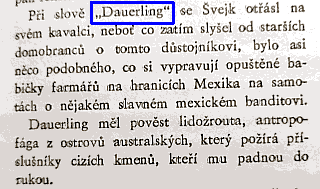
From "The Good Soldier Švejk in captivity", 1917
When investigating Dauerling it is of interest to compare the novel with Dobrý voják Švejk v zajetí (1917) where the junior officer is assigned a much more important role.
The author’s description of him is nearly identical to Marek’s version from the novel: accident as a child that led to a malformed skull, exceptionally stupid and brutal, educated at Hainburger Kadettenschule, had read Drill oder Erziehung (see Johann Orth), quoted Feldmarschall Conrad, rank Fähnrich etc.[a]
Thereafter, however, there are big differences. In Királyhida and at the front Dauerling is the main character alongside Švejk. He actually takes on part of the role that Oberleutnant Lukáš has in the novel. Our good soldier is his servant and steals a dog for him, the affair with Mr. Kakonyi is there with similar details. It is also striking that the author assigned a servant to a junior officer. This may not mean much, but could also indicate that Dauerling's model(s) had a higher rank.
The similarities with Oberleutnant Lukáš are limited to situations and circumstances. Dauerling, as opposed to Lukáš, remains a detestable figure all the way until the plot is concluded at the front when he commands Švejk to shoot him in the arm so he can escape the fighting. The soldier ends up killing him instead, but the question whether or not this was intentional is left open by the author …
A rare surname
The family name Dauerling is extremely rare, underpinned by the fact that neither the address books of Prague or Vienna from the period in question contain any such entry. Modern name databases show up less than ten hits. It is therefore to be expected that there is no Dauerling in neither officer's lists nor casualty lists.
Tragedy in Hollfeld

,13.2.1908
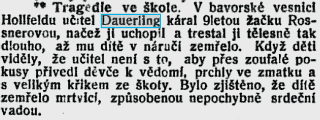
,15.2.1908
One can imagine that the author borrowed the name by chance from news reports that mentioned some Dauerling. These were still few, but one such case springs to the eye: the music teacher Dauerling in Hollfeld in Bavaria beat a nine-year old girl so severely that she died. This happened on 11 February 1908 in front of the whole class and was reported in many newspapers in Austria, including Czech publications. Most German-language newspapers also claimed that Dauerling was a Jew.
The reports from the Hollfeld tragedy also reveal a possible misspelling. Most newspaper in fact referred to the teacher as Deuerling. Čech and Lidové noviny used Dauerling whilst Národní politika and most German language newspapers used Deuerling. The latter is also a more common name, but still not widespread. There are in fact Deuerlings living in Hollfeld to this day, so this is probably the correct spelling. If this is the case the claim that Deuerling was Jewish seems odd. It is very unlikely that Jews from Hollfeld survived the Holocaust.
In the entire armed forces of Austria-Hungary there was in 1914 only one officer named Deuerling. He served in k.k. Landwehr and it is improbable that Hašek was aware of him.
Hauptmann Wimmer, an undeserved reputation

Captain Otto Wimmer: Morávek gave him an undeservedly bad reputation.
© ÖStA
As no Dauerling or anyone with a similarly sounding surname can be associated with IR. 91, possible inspirations may be any officer in the regiment with a reputation as a tyrant. In his series in Večerní České slovo in 1924 Jan Morávek mentions a certain captain Wimmer. Jan Vaněk remembers him as commander of his march company in IR. 91 11th march battalion. Morávek describes Wimmer as "a lunatic who tyrannised the soldiers and even pulled his horse to the battalion report". Immediately before the departure to the front he was allegedly replaced by Rudolf Lukas.
There was only one officer in IR. 91 that fits the name and rank described by Jan Morávek. This person was Hauptmann Otto Wimmer who in the summer of 1915 became commander of the 13th march battalion. They arrived at the front by Bug on 15 August 1915 so from then on Jan Vaněk may again have had to deal with him.
The connection between Dauerling and Wimmer is still only vague; there is for instance a great difference in rank between the two (without this necessarily having been considered important by the author).
Hauptmann Wurm
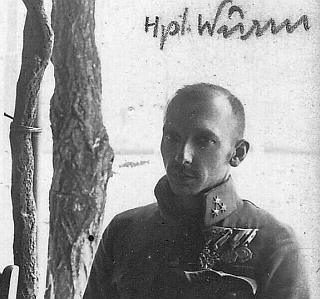
Captain Hans Wurm
"Jednadevadesátníci", , 2018.
We do not know of alternative sources that confirm captain Wimmer's alleged brutality, and recently published information actually clears his name entirely.
Thanks to information in the book Jednadevadesátníci (Jan Ciglbauer, 2018) we can now conclude that Morávek referred to captain Hans Wurm, an officer who according to several witnesses was notoriously cruel, bordering on the insane.
The key phrase is "pulling his horse to battalion report". This is exactly what Oberleutnant Wurm did in Királyhida in 1916, and soldiers from IR. 91 later remembered both this incident and other examples of his senseless brutality.
Still it would be far-fetched to claim that Oberleutnant Wurm was a model for Dauerling. Apart from their common cruel behaviour their life and army career had little in common. Dauerling thus joins the list of characters from The Good Soldier Švejk who lack any obvious real-life counterpart: Feldkurat Katz, hop trader Wendler, telephone operator Chodounský, Offiziersdiener Baloun, cook Jurajda, Leutnant Dub etc.
Quote(s) from the novel
[II.2] Když vypukla válka a všecky mladičké kadetíky udělali fähnrichy, dostal se do archu hainburských povýšenců i Konrád Dauerling a tak se dostal k 91. regimentu.“Jednoroční dobrovolník si oddechl a vypravoval dál: „Vyšla nákladem ministerstva vojenství kniha ,Drill oder Erziehung’, ze které vyčetl Dauerling, že na vojáky patří hrůza. Podle stupňů hrůzy že má též výcvik úspěch.
Credit: Morávek, Jan Ciglbauer
Also written:Konrád Dauerlingcz
Literature
- Dobrý voják Švejk v zajetí, ,1917 [a]
- Aufregender Vorfall in der Schule, ,13.2.1908
- Ein schulmädchen in den Händen des Lehrers gestorben, ,14.2.1908
- Žačka náhle zemřela ve škole, ,14.2.1908
- Ein Kind vom Lehrer zu Tode geprügelt, ,15.2.1908
- Učitel utloukl školačku, ,15.2.1908
- Drill oder Erziehung, ,1883
- Швейк. Комментарии. Шаг 50, ,2012
| a | Dobrý voják Švejk v zajetí | 1917 |
 | Feldmarschall Conrad von Hötzendorf, Franz Xaver Joseph |  | ||||
| *11.11.1852 Penzing - †25.8.1925 Bad Mergentheim | ||||||
| ||||||
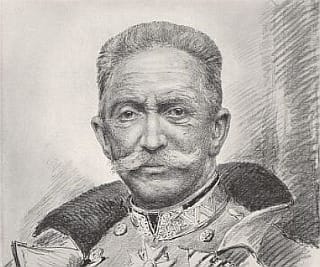
, 22.7.1915
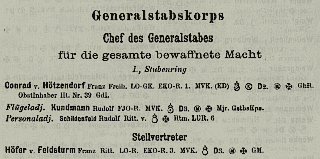
, 1914
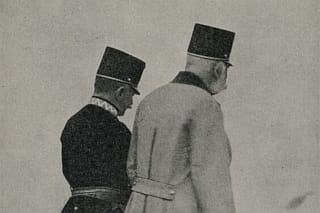
Kaiser Franz Joseph mit Conrad auf dem Manöverfeld 1909.
"Conrad von Hötzendorf, , August Urbanski von Ostrymiecz
Conrad is mentioned in connection with Einjährigfreiwilliger Marek's description of Fähnrich Dauerling who recited a variation of an alleged quote by Conrad: die Soldaten müssen sowieso krepieren (Soldiers must peg out anyway).
Conrad reappears during Kadett Biegler's dream on the train to Budapest. There is a picture of him on the wall of k.u.k. Gottes Hauptquartier. Here he is referred to as Chief of General Staff.
Background
Conrad was an Austrian infantry general, from November 1916 Field Marshal, who acted as head of k.u.k. Generalstab in the periods 1906-1911 and 1912- 1917. He was known for his aggressive stance in foreign policy matters and advocated preventive warfare not only against Serbia but also against Italy. He was head of the general staff until 1 March 1917 when the new emperor Karl I. dismissed him. Conrad is seen by many as carrying a major responsibility for the disastrous policies that led to the outbreak of World War I.
An improbable quote
The authenticity of the quote Die Soldaten müssen sowieso krepieren has not been verified. It should also be noted that Conrad obtained the rank Field Marshall on 23 November 1916, so Einjährigfreiwilliger Marek was looking well into the future during this dialogue with Švejk (that logically must have taken place the previous year).
The Good Soldier Švejk in Captivity
A related quote can be found also in Dobrý voják Švejk v zajetí. Here the author is more direct and claims that Conrad said that die Tschechen müssen so wie so krepieren and that his outburst took place in early January 1916 in Innsbruck, in front of 8. Infanteriedivision.[1]
It seems altogether unlikely that Conrad uttered such sentiments publicly. It is thus tempting to believe that Hašek's quotes were based on rumours or conspiracy theories, or that he simply invented it.
In relation to the alleged quote from Innsbruck it is of interest that Conrad indeed was connected to 8. Infanteriedivision where he was commander from 1903 to 1906. However, it has not been possible to verify any visit to Innsbruck in January 1916. Local newspapers mentioned Conrad a few times around this time, but in very different contexts.
"Die Tschechen müssen so wie so krepieren." To řekl též polní maršálek Conrad z Hötzendorfu počátkem ledna roku 1916 před 8. pěší divizí v Inšpruku.
Quote(s) from the novel
[II.2] Jednou, když rozbil oko jednomu rekrutovi, vyjádřil se: ,Pah, was für Geschichte mit einem Kerl, muß so wie so krepieren.’ To říkal též polní maršálek Konrád z Hötzendorfu: ,Die Soldaten müssen so wie so krepieren.’
[III.1] Uprostřed pokoje, ve kterém po stěnách visely podobizny Františka Josefa a Viléma, následníka trůnu Karla Františka Josefa, generála Viktora Dankla, arcivévody Bedřicha a šéfa generálního štábu Konráda z Hötzendorfu, stál pán bůh.
Also written:Konrád z HötzendorfuHašek
Literature
- Aus meiner Dienstzeit 1906-1918, ,1921
- Conrad von Hötzendorf, Soldat und Mensch, ,1939
- Conrad von Hötzendorf und das AOK, ,2014
- Conrad von Hötzendorf, Franz Xaver Josef Graf,
- Schematismus für das k.u.k. Heer (s. 181), ,1914
- Franz Graf Conrad von Hötzendorf, ,2001 - 2016
- Dobrý voják Švejk v zajetí, ,1917 [1]
| 1 | Dobrý voják Švejk v zajetí | 1917 |
 | Hauptmann Adamička |  | ||||
| ||||||
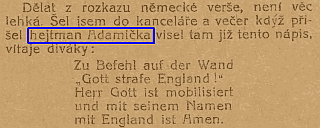
In Hašek's story "Gott strafe England" captain Adamička is given much more space than in the novel.
, 28.10.1917
Adamička is mentioned 4 times in The Good Soldier Švejk.
Adamička was a captain in IR. 91 who Einjährigfreiwilliger Marek tells Švejk about in the cell in Budějovice. Adamička is described as an apathetic man who spoke quietly and stared emptily into the air. He avoids dealing with the brutality of Fähnrich Dauerling. Marek also reveals that Adamička had already been sent to the front, and in his shoes stepped Major Wenzl who put Dauerling firmly in his place. It is unclear what position Adamička (and thus also Wenzl) held in the command hierarchy.
Background
The inspiration for Hašek's literary character was no doubt Josef Adamička, a professional officer who had served with Infanterieregiment Nr. 91 from 1 November 1904. In his capacity as head of Budweiser Einjährigfreiwilligenschule he met Jaroslav Hašek in February and March 1915.
Gott strafe England
Adamička features more prominently in the story Gott strafe England[a] where he indeed has the role as head of Budweiser Einjährigfreiwilligenschule. In this story, he is portrayed as a fanatic who promotes the slogan "God Punish England!" everywhere.
Quote(s) from the novel
[II.2] „To bylo za hejtmana Adamičky, to byl člověk úplně apatický. Když seděl v kanceláři, tu se obyčejně díval do prázdna jako tichý blázen a měl takový výraz, jako by chtěl říct: ,Sežerte si mě, mouchy.’ ,Tak se tedy věci mají,’ řekl hejtman Adamička tiše, neboť on mluvil vždy velice tiše, ,to vám řekl večer na ulici. Třeba zjistiti, zdali jste měl dovoleno vyjít z kasáren. Abtreten!’ Za nějaký čas dal si hejtman Adamička zavolat podavatele stížnosti. ,Je zjištěno,’ řekl opět tak tiše, ,že jste měl povolení vzdálit se ten den z kasáren do deseti hodin večer. A proto nebudete potrestán. Abtreten!’ O tom hejtmanovi Adamičkovi se pak říkalo, že má smysl pro spravedlnost, milý kamaráde, tak ho poslali do pole a namístě něho přišel sem major Wenzl.
Literature
- Gott strafe England, Jaroslav Hašek,15.10.1917J [a]
| a | Gott strafe England | Jaroslav Hašek | 15.10.1917J |
 | Major Wenzl |  | ||||
| ||||||
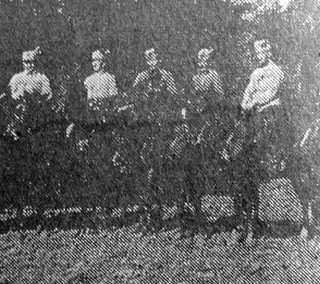
Franz Wenzel, the prototype of Wenzl. First on the right.
, 15.1.1972
Wenzl is mentioned 29 times in The Good Soldier Švejk.
Wenzl was a major at Infanterieregiment Nr. 91 in Budějovice who is introduced to the reader in the conversation between Einjährigfreiwilliger Marek and Švejk in the regimental prison. He had succeeded Hauptmann Adamička and as opposed to his predecessor put Fähnrich Dauerling firmly in his place. Wenzl had a Czech wife and spoke Czech so he greatly feared disputes between the nationalities of the empire. His sons studied Czech.
He detested lower rank officers due to an unfortunate episode years ago when being drunk at a hotel in Kutná Hora he swore at a waiter and called him Czech rabble. Wenzl held the rank of captain in Kutná Hora, so obviously he had been promoted since. His position and role in the command hierarchy of the regiment are not revealed.
He only appears directly in the plot once, in a conversation with Oberst Schröder and Hauptmann Ságner at the hotel in Budějovice. Otherwise Einjährigfreiwilliger Marek reveals that Schröder doesn't like Wenzl.
In Királyhida his name reappears but this time he does not take part in the plot. He is mentioned during Švejk and Oberleutnant Lukáš' episode with Wenzl's servant Offiziersdiener Mikulášek. The author provides some additional information: Wenzl had shown himself utterly incompetent by the Drina where he had ordered the destruction of a pontoon bridge whilst half his battalion was stuck on the other side of the river. Here in Királyhida, he was getting back on his feet; he had been assigned administrative duties and was also the commander of Militärschießstätte (the military shooting range). Wenzl is not part of Švejk's march battalion and this disappears from the story before their departure to the front.
Background
The literary figure Wenzl was no doubt inspired by Franz Wenzel, a professional officer who served with Infanterieregiment Nr. 91 throughout Jaroslav Hašek's stay there. He was commander of the author's XII. Marschbataillon from 1 June to 11 July 1915, and was also his regiment commander for a short period in September.
The Good Soldier Švejk in Captivity
Wenzl features also in Dobrý voják Švejk v zajetí and his role is similar to that of The Good Soldier Švejk. At times the text of the two books is nearly identical.[1]
Když Dauerling udělal ten večer bilanci celého dne, neboť on byl též druhý Titus, a když některý den nikoho nezavřel a nehnal ke kompanieraportu, zvolal též: "Den jsem ztratil!", po rozmluvě s kadetem Bieglerem, svým nejvěrnějším druhem, přišel k tomu názoru, že s tím batalionsraportem přece jen trochu přestřelil, poněvadž to přijde před majora Wenzla. Před majorem Wenzlem třásl se totiž i Biegler i Dauerling stejně tak, jako se zas před nimi třáslo prosté mužstvo. Major Wenzl nebyl sice žádná zvláštní vojenská hvězd rakouská, ale měl strach z národnostních sporů. Měl za manželku Češku a kdysi, když ještě sloužil jako hejtman v Kutné Hoře, přišel do novin, poněvadž jednou v napilosti vynadal číšníkovi v Haškově hotelu "česká pakáž", ačkoli mluvil sám jinak jen česky v domácnosti i ve společnosti.
Quote(s) from the novel
[II.2] O tom hejtmanovi Adamičkovi se pak říkalo, že má smysl pro spravedlnost, milý kamaráde, tak ho poslali do pole a namístě něho přišel sem major Wenzl. A to byl čertův syn, pokud se týkalo národnostních štvanic, a ten zaťal tipec fähnrichovi Dauerlingovi. Major Wenzl má za manželku Češku a má největší strach z národnostních sporů.
[II.2] Plukovník Schröder nemá rád majora Wenzla. Je to vůbec divný pavouk.
[II.3] Švejk seděl na odestlané posteli nadporučíkově a naproti němu seděl na stole sluha majora Wenzla. Major se opět vrátil k regimentu, když byla v Srbsku konstatována jeho úplná neschopnost na Drině. Mluvilo se o tom, že dal rozebrat a zničit pontonový most, když měl ještě půl svého bataliónu na druhé straně. Nyní byl přidělen k vojenské střelnici v Királyhidě jako velitel a měl také co dělat s hospodářstvím v táboře. Mezi důstojníky se vypravovalo, že si major Wenzl nyní pomůže na nohy. Pokoje Lukáše i Wenzla byly na téže chodbě.
[II.3] „Poslušně hlásím, pane obrlajtnant, že nemáme žádný patrony a že ho půjde těžko sestřelit se stolu. Já si dovolím podotknout, pane obrlajtnant, že je to Mikulášek, burš od pana majora Wenzla. Ten dycky ztrácí řeč, když vidí někoho z pánů oficírů. Von se vůbec stydí mluvit. Vono je to vůbec takový, jak říkám, upocený mládě, utahaný. Pan major Wenzl nechá ho vždy stát na chodbě, když jde někam do města, a vono se to žalostivě potlouká po burších v baráku. Kdyby mělo příčinu se leknout, ale vždyť vlastně nic nevyvedlo.“ Švejk si odplivl a v jeho hlase a v tom, že mluvil o Mikuláškovi ve středním rodě, bylo slyšet úplné opovržení nad zbabělostí sluhy majora Wenzla a nad jeho nevojenským chováním.
[II.3] „Tak jsem ti, pitomý chlape, zachránil život. Až se vrátí pan major Wenzl, ať mně za to potichounku přineseš láhev vína. Bez legrace. Zachránil jsem ti opravdu život. Když je můj obrlajtnant vožralej, tak je zle. S tím to umím jen já a nikdo jiný.“ „Já jsem... „Prd jseš,“ opovržlivě vyjádřil se Švejk, „seď na prahu a čekej, až přijde tvůj major Wenzl.“
Literature
- Dobrý voják Švejk v zajetí, ,1917 [1]
| 1 | Dobrý voják Švejk v zajetí | 1917 |
 | Kadettstellvertreter Zítko |  | ||||
| ||||||
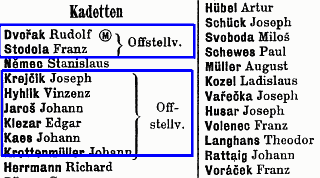
List of cadets who also were officer's deputies, IR 21, 1908
, 1908

The rank Kadett-Offiziersstellvertreter was in 1908 replaced by Fähnrich.
, 1908
Zítko is mentioned 7 times in The Good Soldier Švejk.
Zítko was a reserve cadet from the school of one-year volunteers in Kutná Hora who had fallen out with Major Wenzl. The two had been enemies since Zítko had uttered something along these lines at a party where Wenzl was present: "What is any captain compared to the splendour of nature? The same nobody as any Kadettstellvertreter". From that moment on Wenzl had persecuted the officer's apprentice and from then on he had hated junior officers.
Zítko had his revenge when Major Wenzl in a state of inebriation swore at a waiter in a hotel in Kutná Hora (see Kutnohorský hotel) and called him Czech rabble. Zítko leaked the incident to local newspapers and the case was even heard in Reichsrat. Zítko eventually returned to civilian life where he went on to study philosophy.
Background
It has not been possible to identify any person who could have served as inspiration for the character Zítko. Although incidents like when Major Wenzl swore at a waiter and called him Czech rabble no doubt took place, no such has been pinpointed that could relate to Kutná Hora and even the "prototype" for Wenzl, Franz Wenzel.
Kadettstellvertreter
The rank Kadettstellvertreter never existed as such but Einjährigfreiwilliger Marek probably had Kadett-Offiziersstellvertreter in mind. This was a rank that was replaced by Fähnrich through a decree by Emperor Franz Joseph I. that was issued on 13 November 1908[a]. Before that graduates from schools for one-year volunteers obtained the rank Kadett and some held the additional rank Offiziersstellvertreter, literally officer's stand-in or deputy. As mentioned this was the rank that was replaced by Fähnrich in 1908. The rank Kadett was maintained with the same meaning as earlier.
Considering the time of the abolition of the rank Kadett-Offiziersstellvertreter the incident in Kutná Hora would have taken place many years before Franz Wenzel arrived there in 1913 to serve with Infanterieregiment Nr. 21. Furthermore, no Zítko with the corresponding rank is listed in Schematismus over the years. The only name that frequently appears in military publications is Johann Zitko, a high ranking officer who by 1914 had advanced to a position in Kriegsministerium. Still there served a Fähnrich Karl Zitko in k.k. Landwehrinfanterieregiment Nr. 9 (Litoměřice) before the war[b] but there is no reason to believe that Hašek had heard of him or that he was involved in such an episode.
Quote(s) from the novel
[II.2] ,Stačí,’ povídal kadetstellvertreter Zítko, zamyslit se nad tím, co je každý hejtman proti velebné přírodě. Stejná nula jako každý kadetstellvertreter.’ Poněvadž všichni vojenští páni byli tenkrát namazaní, chtěl hejtman Wenzl nešťastného filosofa Zítka zmlátit jako koně, a nepřátelství toto se stupňovalo a hejtman sekýroval Zítka, kde mohl, tím víc, poněvadž výrok kadetstellvertretera Zítka stal se pořekadlem. ,Co je hejtman Wenzl proti velebné přírodě?’ to znali po celé Kutné Hoře.
Literature
- Mittheilungen des kais. königl. Militär-Geographischen Institutes, ,4..1908 [a]
- Schematismus der k.k. Landwehr (s. 305), ,1912 [b]
| a | Mittheilungen des kais. königl. Militär-Geographischen Institutes | 4..1908 | |
| b | Schematismus der k.k. Landwehr (s. 305) | 1912 |
 | Hauptmann Ságner |  | ||||
| ||||||
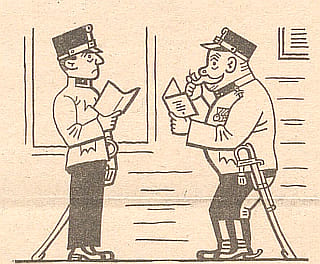
,27.4.1924
Ságner is mentioned 150 times in The Good Soldier Švejk.
Ságner was a captain in Infanterieregiment Nr. 91 and takes part in the plot from Budějovice until the very last section of the novel. He is actually the last person being mentioned in The Good Soldier Švejk. Later on it is revealed that he has a past as a Czech patriot but lets his career take preference. He had attended cadet school in Prague together with Oberleutnant Lukáš (see Prager Infanteriekadettenschule). In general the author's attitude towards Ságner is fairly neutral.
Ságner is first introduced by Einjährigfreiwilliger Marek but enters the plot directly when the author relates from an officer's party at a hotel in Budějovice. Marek also reveals that he was head of Budweiser Einjährigfreiwilligenschule, and looked down on reserve officers and one-year volunteers, looked upon Oberst Schröder as a real type of soldier and is somewhat condescendingly described as "lubricated with all oils", i.e. a slick turncoat.
In Királyhida he was appointed commander of Švejk's march battalion and led the unit until the end of the novel. Soon after departure he was severely embarrassed by Kadett Biegler in the mix-up with the decryption keys involving the book by Ludwig Ganghofer.
According to Rechnungsfeldwebel Vaněk, Ságner had served at the front in Montenegro, and had reportedly proved himself incompetent. He was shot in the hand there and in the hospital he contracted pneumonia before he again appeared in Budějovice. It also appears as if he was commander of EFS-BAK or at least he commanded the school during maneouvres.
Background
The inspiration for the figure Ságner is mainly the Austrian (from 1918 Czechoslovak) officer Čeněk Sagner. He was Jaroslav Hašek's battalion commander in Infanterieregiment Nr. 91 from 11 July to 24 September 1915, and before that, they had served simultaneously in Budějovice and Királyhida. During most of the time Hašek served in the regiment Sagner's rank was Oberleutnant (he was promoted to Hauptmann as late as 1 September). During this period Sagner never commanded any march battalion.
Quote(s) from the novel
[II.2] Hejtman Ságner, který má na starosti školu jednoročních dobrovolníků, vidí v Schröderovi pravý typ vojáka, ačkoliv plukovník Schröder nebojí se ničeho tak jako toho, kdyby měl jít do pole. Ságner je chlap všemi mastmi mazaný a stejně jako Schröder nemá rád reservní důstojníky. Říká o nich, že jsou to civilní smradi. Na jednoročáky dívá se jako na divoká zvířata, ze kterých je třeba udělat vojenské stroje, přišít jim hvězdičky a poslat na frontu, aby je vybili místo ušlechtilých aktivních důstojníků, které třeba zachovat na plemeno.
[II.2] „On skládá básničky,“ posměšně se ozval hejtman Ságner, „sotva přijel, tak se zamiloval do paní inženýrové Schreiterové, s kterou se setkal v divadle.“ Plukovník se zachmuřeně podíval před sebe: „Prý umí zpívat kuplety?“ „Už v kadetce nás velice bavil kuplety,“ odpověděl hejtman Ságner, „a anekdoty zná, jedna radost. Proč nejde mezi nás, nevím.“
[II.2] Vrátiv se od hejtmana Ságnera, plukovník Schröder zastavil se před Švejkem a podíval se na něho pozorně.
 | Carpenter Mlíčko |  | ||||
| ||||||

Antonín Mlíčko
,19.11.1914
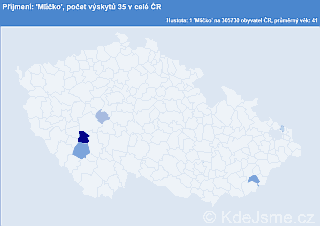
Only 35 persons carry the surname Mlíčko in 2021.
2017
Mlíčko was a carpenter from Vávrova třída in Královské Vinohrady who was awarded the large silver medal from brewery because he was the first in his regiment who had his leg torn off by a shell. After returning home he was given an artificial leg but during a brawl at Apollo, some butchers tore it off and whacked him on his head with it. All this is according to a story Švejk tells Einjährigfreiwilliger Marek in the arrest in Budějovice. The carpenter is not to be confused with bricklayer Mlíčko.
Background
Švejk here provides information that normally would be enough to identify any "model": profession, address, that he was wounded (there would be an entry in Verlustliste) and that he was given the great silver medal for bravery (a Belohnungsantrag would be found in Kriegsarchiv in Vienna).
Vinohrady
In Vinohrady lived in 1910 a couple of Mlíčko but none of them were carpenters or lived in Vávrova třída. In this street there were three listed with this profession: Antonín Pospíšil in no. 1, Jan Straub in no. 9 and Karel Šmerák in no. 31[d]. None of the carpenters in Vinohrady had surnames that resembled Mlíčko.
Korporal Mlíčko
In Verlustliste Nr. 63 from 19 November 1914 some Korporal Antonín Mlíčko is listed as Verwundet and at first glance, he seems to be a candidate. He would have been wounded very early in the war as it could take months from the time the soldier was wounded/dead/reported missing until his name appeared in the official casualty lists. Mlíčko was from okres Dejvice and served with Infanterieregiment Nr. 11 in the 15th company[a], born in 1887. Information about any silver medal for bravery is not yet available.
Police records reveal that Mlíčko was born in 1885 (not 1887 as the loss list indicates), from 24 July 1906 he lived in Dejvice no. 154 with his mother, his profession was not specified[b]. His mother's birthplace of Velká Turna by Písek explains why he served in Infanterieregiment Nr. 11 as his Heimatrecht here probably followed that of his mother (there is no information about his father). It appears unlikely that he was a "carpenter from Vávrova třída" but it can't be entirely ruled out that he between 1906 and 1914 had learned this profession and moved to Vinohrady. This theory is however weak as the 1925 address book reveals that he still lived in Dejvice and was employed on the railways[c].
A rare name
Mlíčko is a rare surname and in 2021 only 35 persons are named such. Many of them live in the area around Blatná. The address books from Prague in 1907 and 1910 only show 6 persons with this surname.
Quote(s) from the novel
[II.2] „O velkej stříbrnej medalii za udatnost, kterou dostal jeden truhlář z Vávrovy ulice na Král. Vinohradech, nějakej Mlíčko, poněvadž byl první, kterému u jeho regimentu utrh na začátku války granát nohu. Dostal umělou nohu a počal se všude chvástat se svou medalií a že je vůbec první a nejprvnější mrzák od regimentu za války. Jednou přišel do ,Apolla’ na Vinohradech a tam se dostal do sporu s řezníky z porážky, kteří mu nakonec utrhli umělou nohu a praštili ho s ní přes hlavu. Ten, co mu ji utrh, nevěděl, že je to umělá noha, tak z toho leknutí omdlel. Na strážnici zas Mlíčkovi nohu přidělali, ale od té doby dostal Mlíčko zlost na svou velkou stříbrnou medalii za udatnost a šel ji zastavit do zastavárny a tam ho zadrželi i s medalií. Měl z toho opletání, a je nějaký takový zvláštní čestný soud pro válečné invalidy, a ten ho odsoudil k tomu, že mu vzali tu stříbrnou medalii a pak ho odsoudili ještě ku ztrátě nohy...“
Literature
- Verlustliste ausgegeben am ..., ,19.11.1914 [a]
- Pobytové přihlášky pražského policejního ředitelství, ,1851 - 1914 [b]
- Chytilův adresář hl. města Prahy, ,1925 [c]
- Adresář královského hlavního města Prahy a obcí sousedních, ,1910 [d]
| a | Verlustliste ausgegeben am ... | 19.11.1914 | |
| b | Pobytové přihlášky pražského policejního ředitelství | 1851 - 1914 | |
| c | Chytilův adresář hl. města Prahy | 1925 | |
| d | Adresář královského hlavního města Prahy a obcí sousedních | 1910 |
 | Kanonýr Jabůrek |  | ||||
| ||||||
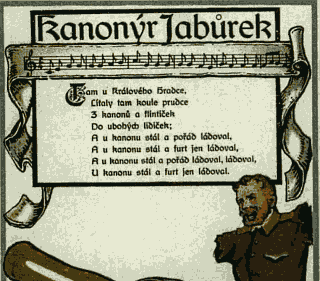
Postkarte Kanonýr Jabůrek. Verlag: M. Schultz, Prag 1914 (ÖNB)
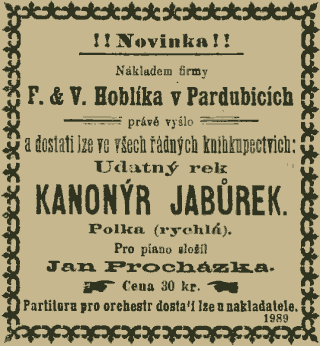
,17.2.1886
Jabůrek was an artilleryman Einjährigfreiwilliger Marek and Švejk sang about in the cell in Budějovice. The singing provoked a visit from the officer on guard-duty, Leutnant Pelikán. The refrain of the song is accuratly reproduced in the novel, some fragments of verse 12 less so.
Background
Kanonýr Jabůrek was a figure from a song story (cantastoria) Udatný rek kanonýr Jabůrek which had its background from the Austro-Prussian war of 1866. It is unclear whether it had any factual foundation, but in any case it appeared as a parody around 1884, perhaps even before. Jabůrek took part in the deciding battle by Hradec Králové on 3 July 1886. He keeps loading his cannon even as his limbs and other parts of the body are torn off, until his head is blown off and it reports to the general that he is no longer able to salute. The song is written in colloquial Czech and contains 17 verses.
The first verse of the song was printed on a postcard from 1914, but in formally written Czech. It was part of a series of patriotic songs issued on post-cards in Prague after outbreak of war. Why this obviously satirical song was included in the collection begs a good answer. In 1986 Franz Hiesel made a radio play based on the song. It was broadcast both in West Germany (WDR) and Austria (ORF). Over the years the cannoneer has been mentioned numerous times in the Czech press and other publications.
Egon Erwin Kisch dedicates a chapter to Jabůrek in his book Aus Prager Gassen und Nächten from 1912[a].
Quote(s) from the novel
[II.2] Tak mně připadá,“ řekl jednoroční dobrovolník po krátké pomlčce, „že duch vojenský v nás upadá, navrhuji, milý příteli, abychom v noční tmě, v tichu našeho vězení si zazpívali o kanonýrovi Jabůrkovi. To povznese vojenského ducha. Ale musíme řvát, aby to bylo slyšet po celých Mariánských kasárnách. Navrhuji proto, abychom se postavili ke dveřím.“
[II.2] A z arestu ozval se za chvíli řev, až se na chodbě okna třásla:
...A u kanonu stál a pořád ládo - ládo... a u kanonu stál a pořád ládoval.
Přiletěla koule prudce, utrhla mu obě ruce, a von klidně stál a pořád ládo - ládo... u kanonu stál a pořád ládoval...
Credit: Jaroslav Šerák, Hans-Peter Laqueur, Egon Erwin Kisch
Also written:Kanonier JabůrekdeCannoneer JabůrekenKanonér Jabůrekno
Literature
- Udatný rek Kanonýr Jabůrek,
- Das Lied vom Kanonier Jaburek, ,1912 [a]
- Udatný rek kanonýr Jabůrek,
- Zprávy literární, ,27.9.1885
- Hudba, ,22.12.1885
| a | Das Lied vom Kanonier Jaburek | 1912 |
 | Leutnant Pelikán, František |  | ||||
| ||||||

, 1910
Pelikán was a reserve lieutenant who in civilian life worked as mathematician in an insurance company. He knew Einjährigfreiwilliger Marek from Česká beseda and helped the two prisoners in the arrest in Budějovice (Marek and Švejk) by providing cigarettes of the brand "Sport".
Background
The surname Pelikán appears twice in the loss list of Infanterieregiment Nr. 91 but both these were common infantrymen and moreover named Alois[a] so can hardly have served as prototypes for the lieutenant. Some infantryman Franz Pelikan fell in 1914 but nor he could have served as inspiration for his literary namesake. Any reserve lieutenant or other officer with this surname is not evident in the list of officer's from IR. 91. Because the plot is set in the garrison arrest he may also have been assigned to other regiments from the south bohemian capital, i.e. Feldkanonenregiment Nr. 24 or LIR29.
In k.k. Landwehr a certain Franz Pelikan served, but he was a medical doctor and had no connection with units that were stationed in Budějovice[c]. Otherwise many officers with this surname served in the armed forces but none of them was named František/Franz.
Considering the lack of possible models from the armed forces it is reasonable to assume that Hašek borrowed the name from someone he knew from civilian life. Pelikán is a very common Czech surname and in the address book for Prague from 1910 many were listed, amongst them several named František. These represented many professions but none of them seemed to have been employed in an insurance company. Nor does the address book of Budějovice reveal any person with characteristics that resemble those of Einjährigfreiwilliger Marek's acquaintance.
Quote(s) from the novel
[II.2] „To je profous,“ řekl jednoroční dobrovolník, „jde s ním lajtnant Pelikán, který má dnes službu. Je to reservní důstojník, můj známý z ,České besedy’, v civilu je matematikem v jedné pojišťovně. Od toho dostaneme cigarety. Řveme jen dál.“
[II.2] „Nechte toho,“ řekl poručík Pelikán naoko přísně, „myslím, že víte, že máte jít v devět hodin ležet a netropit hluk. Vaše koncertní číslo je slyšet až na náměstí.“
[II.2] Když to bylo splněno, jednoroční dobrovolník důvěrně řekl: „Tak vysyp cigarety, Franto.
Literature
- Seznamy ztrát - 91. pěší pluk, ,2021 [a]
- Verlustliste Nr. 110, ,22.1.1915 [b]
- Ranglisten der K. K. Landwehr und der K. K. Gendarmerie, ,1916 [c]
| a | Seznamy ztrát - 91. pěší pluk | 2021 | |
| b | Verlustliste Nr. 110 | 22.1.1915 | |
| c | Ranglisten der K. K. Landwehr und der K. K. Gendarmerie | 1916 |
 | Oberleutnant Kretschmann |  | ||||
| ||||||

The only senior lieutenant Kretschmann in k.u.k. Heer could not possibly have been present at a hotel in Budějovice in 1915.
,27.9.1914
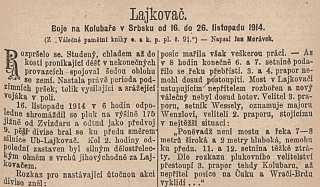
Kretschmann was a senior lieutenant who at Budějovický hotel in an inebriated state related to his officer colleagues how he from his staff position had witnessed an attack on Serbian positions. He had returned from Serbia with a sore leg after having been gored by a cow.
Background
An Oberleutnant Gustav Kretschmann is actually entered in Schematismus from 1914[a]. He is however listed under Infanterieregiment Nr. 11 but because this was the neigbour regiment of IR. 91 both at home and at the front it is possible that Hašek came across him. Still it is unlikely that he turned up at a hotel in Budějovice in 1915 and Prager Tagblatt and Verlustliste puts this hypothesis to bed. Kretschmann was one of the many who lost their lives during the disastrous crossing of Drina on 8 September 1914.
Kretschmann's long deliberation is strikingly similar to stories from Kriegskalender so it may well be that Hašek also picked the motif from one of these. This was a source he at times borrowed from. An example of such descriptions can be found in the 1919 issue (published in August 1918). It was written by Jan Morávek and the theme is the battle by the Serbian river Kolubara in November 1914.
Quote(s) from the novel
[II.2] Zatímco jednoroční dobrovolník pronášel zdrcující kritiku poměrů v kasárnách, plukovník Schröder seděl v hotelu ve společnosti důstojníků a poslouchal, jak nadporučík Kretschmann, který se vrátil ze Srbska s bolavou nohou (trkla ho kráva), vypravoval, jak se díval od štábu, ku kterému byl přidělen, na útok na srbské posice:
Literature
- Schematismus für das k.u.k. Heer (s. 399), ,1914 [a]
| a | Schematismus für das k.u.k. Heer (s. 399) | 1914 |
 | Hauptmann Spíro |  | ||||
| ||||||
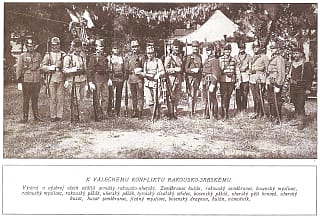
Representatives of 15 types of units in the Dual Monarchy's armed forces. All these are found amongst the 19 that captain Spíro reels off, and the order is identical.
, 31.7.1914
© Jaroslav Šerák, Národní knihovna

The only officer named Spiro in the entire armed forces can hardly have inspired the drunk captain at the hotel in Budějovice.
, 30.4.1915
Spíro was a captain who at Budějovický hotel reeled off the most incoherent of observations. He listed 19 types of units in the armed forces, pulled in Belgium, and banging his fist on the table, he concluded: "k.k. Landwehr serves the land in peacetime".
Background
Spiro is a surname of Jewish origin and is not common. In the Czech republic currently (2021) only two of them live, and in Prague, there were only four registered with the police during the whole century leading up to 1914. The list of Czech Holocaust victims does however contain many Spiro.
Picked from Světozor?
The tirade where Spíro mentions the branches of the k.u.k. armed forces has all the hallmarks of being pulled from written material. Jaroslav Šerák points to Světozor from 31 July 1914 as a good candidate. In this magazine there is a picture of 15 soldiers from various branches of the Austro-Hungarian armed forces, and Spíro reels off all of them, and adds four more. He lists them in an order than is idential to that used in the caption of the picture in Světozor. The picture was printed the same day in Rozkvět and Český svět. Later it appeared in a larger publication about WW1[d].
In the army
In the entire k.u.k. Heer only one officer called Spíro served in 1914 (and in k.k. Landwehr none). He was reserve lieutenant Hans Spiro from Feldkanonenregiment Nr. 6 (Wiener Neustadt)[a]. He was the son of the paper manufacturer Emanuel Spiro in Krumau and was amongst those who fell into captivity on 22 March 1915 when Przemyśl surrended[b]. In May 1918 newspapers reported that he had returned.
Industrialists in Krumlov
Newspaper searches show the most hits on the abovementioned industrialist family in Krumau. They were one of the largest paper manufacturing enterprises in the entire Dual Monarchy[c], were thus well known and hence a name Hašek may have come across and borrowed for literary purposes. Still, we can safely conclude that there was no drunk captain Spíro in any hotel in 1915, so if the literary captain had any mirror in real life his name would have been something else.
Quote(s) from the novel
[II.2] A důstojník s bolavou nohou se zamlčel a zůstal sedět tupě na židli. Plukovník Schröder se milostivě usmívá a poslouchá, jak naproti hejtman Spíra, jako kdyby se chtěl hádat, tluče pěstí do stolu a opakuje něco, co nemá žádného významu a čemuž není naprosto rozumět, co to vlastně má znamenat a co chce tím říct:
[II.2] „Uvažte prosím dobře. Máme ve zbrani rakouské zeměbranecké hulány, rakouské zeměbrance, bosenské myslivce, rakouské myslivce, rakouské pěšáky, uherské pěšáky, tyrolské císařské střelce, bosenské pěšáky, uherské pěší honvédy, uherské husary, zeměbranecké husary, jízdní myslivce, dragouny, hulány, dělostřelce, trén, sapéry, sanitu, námořníky. Rozumíte? A Belgie? První a druhá výzva vojska tvoří operační armádu, třetí výzva obstarává službu v zádech armády...“
[II.2] Hejtman Spíro udeřil pěstí do stolu. „Zeměbrana vykonává službu v zemi v čas míru.“
Credit: Jaroslav Šerák
Literature
- Schematismus für das k.u.k. Heer (s. 792), ,1914 [a]
- Kriegsgefangenen, ,30.4.1915 [b]
- Spiro. Papierfabrikanten. (jüdisch), ,2010 [c]
- Uniformtypen der österreichisch-ungarischen Armee, ,1915 [d]
| a | Schematismus für das k.u.k. Heer (s. 792) | 1914 | |
| b | Kriegsgefangenen | 30.4.1915 | |
| c | Spiro. Papierfabrikanten. (jüdisch) | 2010 | |
| d | Uniformtypen der österreichisch-ungarischen Armee | 1915 |
 | Mrs. Schreiterová |  | ||||
| ||||||

Schreiter is an extremely rare surname in Czechia.
2017
Schreiterová was an engineers' wife who Oberleutnant Lukáš had fallen in love with after meeting her at the theatre in Budějovice (see Budějovické divadlo). This was according to Hauptmann Ságner.
Background
No Schreiter was listed in the address book for Budějovice in 1915 so it's pretty futile to look further for any model for this engineer and his wife. Still the name and profession may have been "transferred" from sowmehere else but it would be like searching for the proverbial needle in the haystack. The only high profile person with the surname Schreiter that we know about whas a member of Reichsrat but he was from Litoměřice/Leitmeritz and as far as we know not an engineer. Schreiter is an altogether rare surname and not even in Verlustliste for Infanterieregiment Nr. 91 does it appear.
Quote(s) from the novel
[II.2] „On skládá básničky,“ posměšně se ozval hejtman Ságner, „sotva přijel, tak se zamiloval do paní inženýrové Schreiterové, s kterou se setkal v divadle.“
 | Oberleutnant Dankl |  | ||||
| ||||||
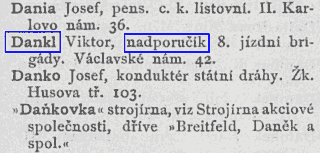
, 1884
Dankl was a senior lieutenant who used to entertain at the officer's club by sticking a herring's tail up his bottom to do a mermaid performance. This according to Oberst Schröder when he at Budějovický hotel remembered the good old days.
Background
Because Oberst Schröder here remembers the old days there is no point in looking for a "model" in Schematismus from 1914. That said, there was only one Dankl in k.u.k. Heer that year, and he was the famous General Dankl. In 1881 he was Oberleutnant at 8. Cavalerie-Brigade, assigned to k.u.k. Generalstab and serving in Prague[a].
That same year Oberst Schröder's literary counterpart, Karl Schlager, served as Leutnant in Feldjägerbataillon Nr. 38 in Kaaden/Kadaň so it's unlikely that the two knew each other. Also in 1890 and in 1900 the future general Dankl was the only person with this surname in the entire army.
In Prague no Dankl was registered by the police so Hašek can not have borrowed the name from someone he knew from his home city. In the end the author of The Good Soldier Švejk probably borrowed the name of the general and for literary purposes provided him with a herring's tail up his backside.
Quote(s) from the novel
[II.2] Jeden, pamatuji se, nějaký nadporučík Dankl, ten se svlékl do naha, lehl si na podlahu, zastrčil si do zadnice ocas ze slanečka a představoval nám mořskou pannu.
Literature
| a | Kais. Königl. Militär-Schematismus für 1882 | 1881 |
 | Leutnant Schleisner |  | ||||
| ||||||

Schleissner, a reserve lieutenant in IR. 28.
, 1901

Schleissner, a wholesaler in spirits in Prague.
, 1907
Schleisner was a lieutenant who could wiggle his ears and whinny like a stallion, miaow like a cat and hum like a bumblebee. Again it is Oberst Schröder remembering the old days at Budějovický hotel.
Background
There are no search hits on Schleisner in Schematismus, neither for k.u.k. Heer nor k.k. Landwehr over the years until and including 1914. In the Prague police registers the surname appears only once between 1850 and 1914 so it was evidently extremely rare.
On the other hand, the phonetically identical Schleissner was more common. Schematismus from 1901 lists a reserve lieutenant Siegfried Schleissner who served with Infanterieregiment Nr. 28, Prague's own "Hausregiment"[a]. Hypothetically it could therefore be that Karl Schlager (the "model" for Oberst Schröder) who himself was from Prague came across him. Still, it would be far fetched to draw further conclusions.
Furthermore, one Siegfried Schleissner (perhaps identical to the above-mentioned lieutenant) was the owner of the spirits wholesaler Schleissner & Grünhut in Prague[b] and this is a person that Hašek may have been aware of and made him the subject of ridicule.
Quote(s) from the novel
[II.2] Jiný zas, poručík Schleisner, uměl střihat ušima a řičet jako hřebec, napodobovat mňoukání koček a bzučení čmeláka.
Literature
- Schematismus für das k.u.k. Heer (s. 321), ,1901 [a]
- Adressář královského hlavního města Prahy a sousedních obcí, ,1907 [b]
| a | Schematismus für das k.u.k. Heer (s. 321) | 1901 | |
| b | Adressář královského hlavního města Prahy a sousedních obcí | 1907 |
 | Hauptmann Skoday |  | ||||
| ||||||
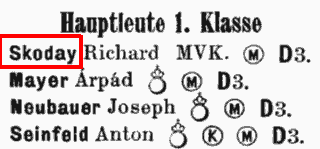
Skoday, captain in IR51.
, 1908
Skoday was a captain who brought to the officer's club three sisters he had trained like dogs. There they engaged in debauched forms of entertainment. Oberst Schröder remembers this with glee when he at Budějovický hotel thinks of the good old days.
Background
Skoday was a very rare surname, seemingly a Hungarian variation of Škoda, and Schematismus shows that just one officer such named served in k.u.k. Heer. This man was Richard Skoday who served with various regiments in Transylvania. He started his career with Infanterieregiment Nr. 63[1] in 1879, and in 1895 he attained the rank of Hauptmann. On 28 October 1906[b] he was transferred to IR 51[2], and on 1 November 1908, he was promoted to Major. In 1909 he was transferred to IR 31[3]. On 1 May 1912, he was promoted to Oberstleutnant and at the end of 1913 superarbitrated[c].
After the outbreak of war, he returned to the army and was named commander of a march battalion of IR 51. On 1 March 1915, he was promoted to Oberst and in April he became commander of his former IR 63. In 1917 he was named commander of 47. Infanteriebrigade and in 1918 he according to Österreich-Ungarns letzter Krieg commanded a division. Address books for Linz from 1930 to 1940 list a pensioned Generalmajor Richard Skoday he is definitely our captain from IR 63.
Coincidence?
Skoday's term as Hauptmann lasted from 1895 to 1908 so would in theory fit with Oberst Schröder's harking back to the "good old days". Still, as in the case of Leutnant Schleisner, the places he served at do not overlap with those of Karl Schlager, the prototype for Schröder. Still, it is striking that Hašek picked the name Skoday considering how rare it was. All in all, it appears as if the author of The Good Soldier Švejk somehow was aware of Richard Skoday, but how this could have come about is impossible to say.
Quote(s) from the novel
[II.2] Pamatuji se také na hejtmana Skodayho. Ten vždy, když jsme chtěli, přivedl do kasina holky, byly to tři sestry, a měl je nacvičené jako psy. Postavil je na stůl a ony se začaly před námi obnažovat do taktu. Měl takovou malou taktovku, a všechna čest, kapelník byl znamenitý. A co s nimi prováděl na pohovce! Jednou dal přinést vanu s teplou vodou doprostřed místnosti a my jeden po druhém museli jsme se s těma holkama vykoupat a on nás vyfotografoval.“
| 1. | Ergänzungsbezirk Nr. 63 Besztercze (now Bistrița). |
| 2. | Ergänzungsbezirk Nr. 51 Koloszvár (now Cluj). |
| 3. | Ergänzungsbezirk Nr. 31 Nagyszeben (now Sibiu). |
Literature
- Schematismus für das k.u.k. Heer (s. 521), ,1903 [a]
- Verordnungsblatt für das k. u. k. Heer, ,30.10.1906 [b]
- Verordnungsblatt für das k. u. k. Heer, ,20.12.1912 [c]
| a | Schematismus für das k.u.k. Heer (s. 521) | 1903 | |
| b | Verordnungsblatt für das k. u. k. Heer | 30.10.1906 | |
| c | Verordnungsblatt für das k. u. k. Heer | 20.12.1912 |
 | Einjährigfreiwilliger Marek |  | |||
| |||||
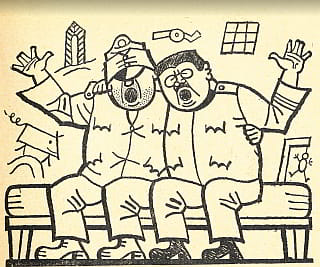
Marek and Švejk as inmates in Budějovice.
,1924
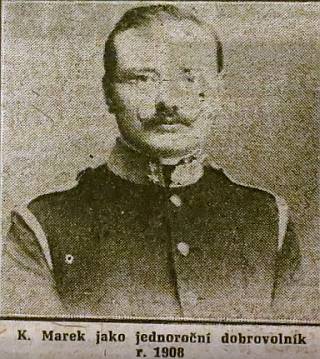
, 11.4.1983 (Augustin Knesl)
Marek is mentioned 33 times in The Good Soldier Švejk.
Marek was a fat one-year volunteer who Švejk met for the first time in the regiment arrest in Mariánská kasárna in Budějovice. They shared a cell for three days and entertained themselves hugely. Marek is the first person in the novel who is an outspoken opponent of the war. In civilian life, he studied classical philosophy. It is never revealed where he lives and where he comes from although he at one time must worked in Prague as editor of the journal Svět zvířat.
Marek appears regularly throughout the rest of the novel, but rarely in such a prominent role as here in the arrest. His real name is only revealed when he goes on regimental report, so far he has been referred to as "the fat one-year volunteer". He had been arrested after knocking the cap off the artillery officer Leutnant Anton after having mistaken him for Einjährigfreiwilliger Materna. This led to the discovery that he had forged the hospital sick book to get away to take part in the nocturnal delights of the southern Czech metropolis. As punishment, he was handed 21 days "severe", stripped of his right as a one-year volunteer, and given kitchen service. This suited him perfectly, it was far better to peel potatoes than to be commanded to attack under enemy fire with his trousers full.
On the train from Budějovice to Királyhida Marek is the main focus. Together with Švejk and some others, he is transported in the prisoner's wagon where he spends most of the time ridiculing a stupid corporal who escorts them. Moreover, he uses the occasion to relate his experiences as editor of Svět zvířat. He was dismissed from this journal after having written incredible stories and even invented new animals. After Marek "discovered" Engineer Khún's Flea a heated debate erupted in the columns of Čech and Čas and the readers of Svět zvířat and his career took a downwards turn. Then he followed up with a few inventive news items about bee- and poultry-keeping and the magazine started to receive threatening letters from the readers. It got even worse when Marek cut and pasted a picture of a jay with a caption he thought up. Jos. M. Kadlčák reacted with an irate postcard to the editor, Marek answered him most rudely, and Kadlčák retorted with an editorial in his newspaper Selský obzor. Marek's employer Fuchs couldn't fail to notice the upheavals, sparking the end of Marek's career as editor of the animal journal. Due to the stress, the owner of the magazine died three days after.
Marek re-enters the plot in a prison cell in Királyhida. Here he meets Švejk and Sappeur Vodička who were imprisoned after the brawl with KAKO. Marek had been arrested because he refused to clean the latrines. In Budapest he is finally released and becomes Battallionsgeschichteschreiber, a duty he fulfils honourably: he writes the history of the battalion in advance. Marek is from then on part of the plot all the way to the final pages of the novel.
Background
Marek has many traits in common with the author of The Good Soldier Švejk. From a purely biographical point of view, these are: one-year volunteer, served in Infanterieregiment Nr. 91, expelled from the reserve officer's school, stay in a military hospital in Budějovice, locked up at Mariánská kasárna, editor of Svět zvířat. Hašek even turned up at the Budějovice garrison in civilian clothes and a cylinder hat, just like Marek did.
On ideas and personal qualities, the following fit: intense dislike of the monarchy and its institutions, anti-war attitudes, glittering rhetoric, fat, unusually good memory and grasp of detail. It is also obvious that Marek is a mouthpiece for Jaroslav Hašek's personal views.
Karel Marek
Experts seem to agree that the name of the one-year volunteer is borrowed from Karel Marek (1884-1945), a friend of Jaroslav Hašek from his youth. Václav Menger relates that the young Hašek often visited the Marek family at Vinohrady and that he particularly enjoyed listening to the stories Karel's father told from his experience in the Prussian War of 1866. From him, the young author also learnt many of the army songs that he was so fond of singing. Karel Marek himself actually served a one-year volunteer but with Infanterieregiment Nr. 28, Prague's house regiment.
Karel Marek was, according to Augustin Knesl, born in 1884, son of Jan and Anna Marek. Like Jaroslav Hašek, young Karel studied at Obchodní akademie in Resslova ulice, albeit two years later (i.e. 1901-1904). He worked as an official but was also an artist, mastering painting and writing. He met with Hašek also after the war and some material about the author was kept by his wife Marie Marková. At the end of World War II Marek was interned in Terezín and on 15 May 1945 he died as a result of the mistreatment he suffered in the camp.
Marek's Seven Wonders of The Animal World
Seven animal species were "discovered" by Marek during the time he edited Svět zvířat, summarised in the table below. The English names and Marek's words are from Zenny Sadlon's translation (2009). The names used by Cecil Parrott (1973) differ slightly and Paul Selver (1930) left Marek's experiences at the journal out of this translation altogether.
| Czech | English | Marek | In Svět zvířat |
|---|---|---|---|
| velryba sírobřichá | sulphur-bellied whale | this new whale species of mine had the size of a cod fish and was equipped with a bladder filled with formic acid... | On 1 June 1909 the editorial Modern whale-hunting was published, signed Frant. Winter. Here the sulphur-bellied whale is mentioned and but is revealed as another word for the blue whale. The article is translated from German, most probably by Hašek. |
| blahník prohnaný | blisser-the-artful | a mammal from the kangaroo family | No obvious connection. |
| vůl jedlý | ox-the-edible | archetype of the cow | No obvious connection. |
| nálevník sepiový | sepian infusorian | which I characterized as a type of sewer rat | Infusoria are microorganisms living in freshwater. They are mentioned in Svět zvířat (e.g. 1 March 1912) but not at the time when Hašek edited the magazine. The word sepiový also appears but not in a context that can be linked to the description in The Good Soldier Švejk. |
| netopýr vzdálený | bat-the-remote | a bat from the island of Iceland | Bats are mentioned many times during the time Hašek edited Svět zvířat. Interesting is a minor item about bats, dated 1 February 1909. This was printed at the very beginning of Hašek's editorship. On the other hand: Iceland is not mentioned at all. |
| pačucha jelení dráždivá | deer-sniffer the irritable | domestic cat from the summit of the mount Kilimanjaro | No obvious connection. |
| blecha inženýra Khúna | engineer Khún’s flea | found in amber and blind “because it lived on an underground prehistoric mole, which was also blind | A story with many similarities was published on 1 September 1911, albeit at a time when Hašek no longer worked for Svět zvířat. The story was exposed as a hoax by Právo lidu on 19 August 1913, causing minor headlines in several newspapers. See Engineer Khún's Flea. |
Quote(s) from the novel
[II.2] V tmavém prostoru lidomorny Mariánských kasáren Švejka uvítal srdečně tlustý jednoroční dobrovolník, provalující se na slamníku.
[II.2] A právě takovým hlasem pronesl plukovník: „Jednoroční dobrovolník Marek odsuzuje se: jednadvacet dní verschärft a po odpykání trestu do kuchyně škrábat brambory.“ ... A lump Marek stál vedle Švejka a tvářil se úplně spokojeně. Lépe to už s ním dopadnout nemohlo. Je rozhodně lepší škrábat v kuchyni brambory, modelovat blbouny a obírat žebro než řvát s plnými kaťaty pod uraganním ohněm nepřítele: „Einzelnabfallen! Bajonett auf!“
Credit: Václav Menger, Augustin Knesl
Literature
- Rukopis ..., Zdena Ančík,16.8.1952



|
II. At the front |
 | |
2. Švejk's budějovická anabasis | |||
| © 2008 - 2024 Jomar Hønsi | Last updated: 20.11.2024 |


